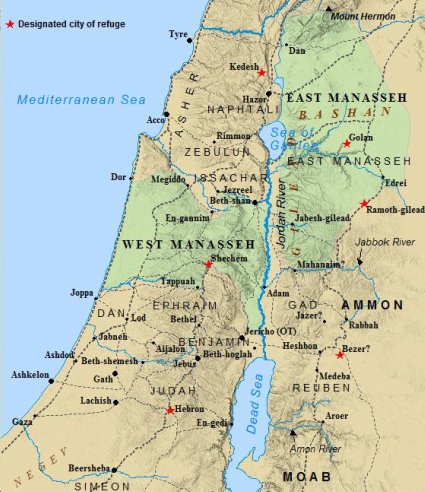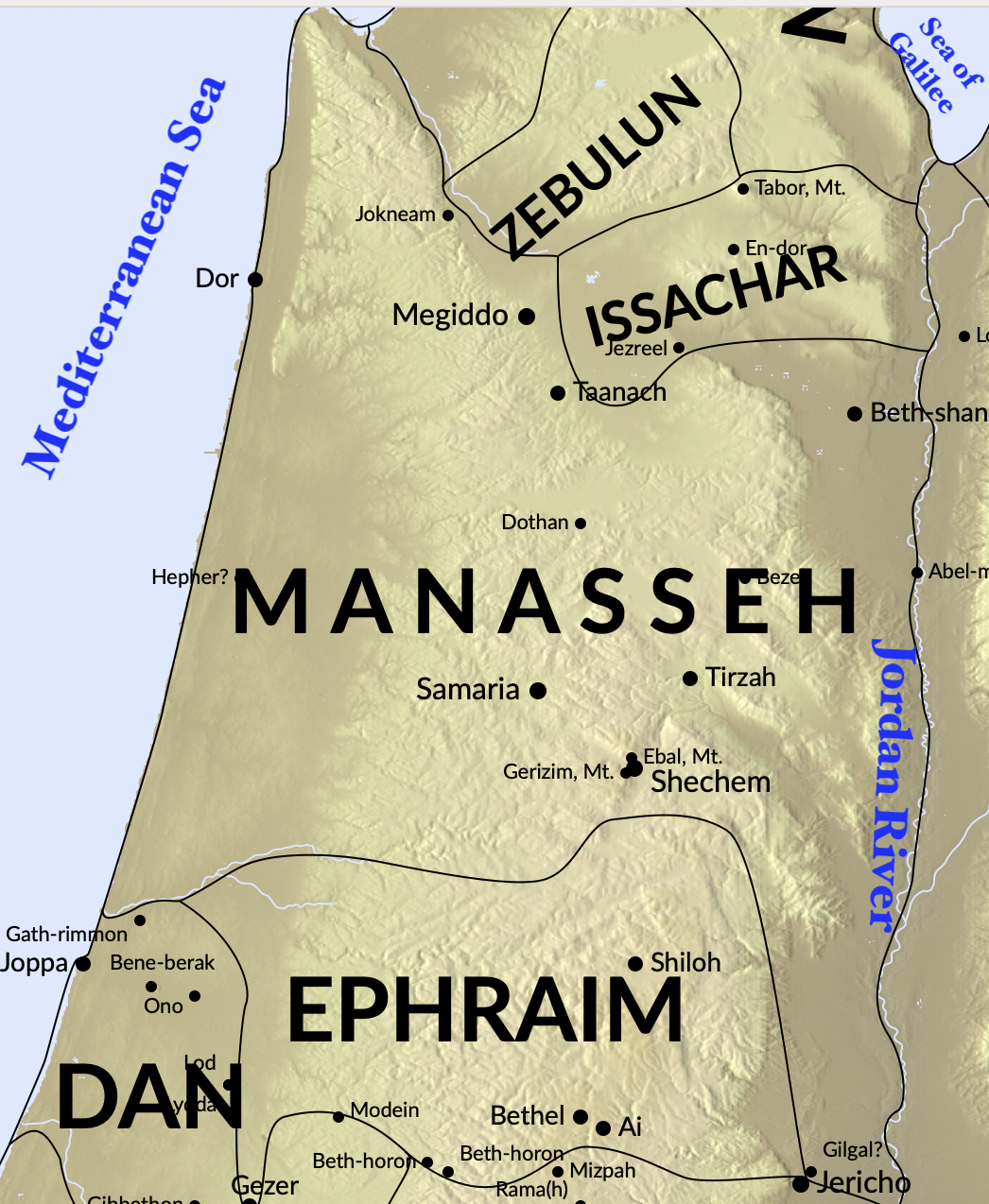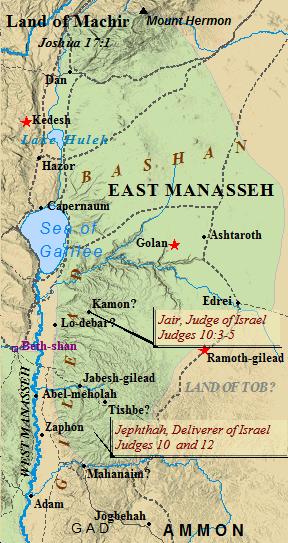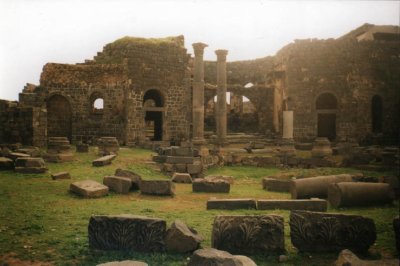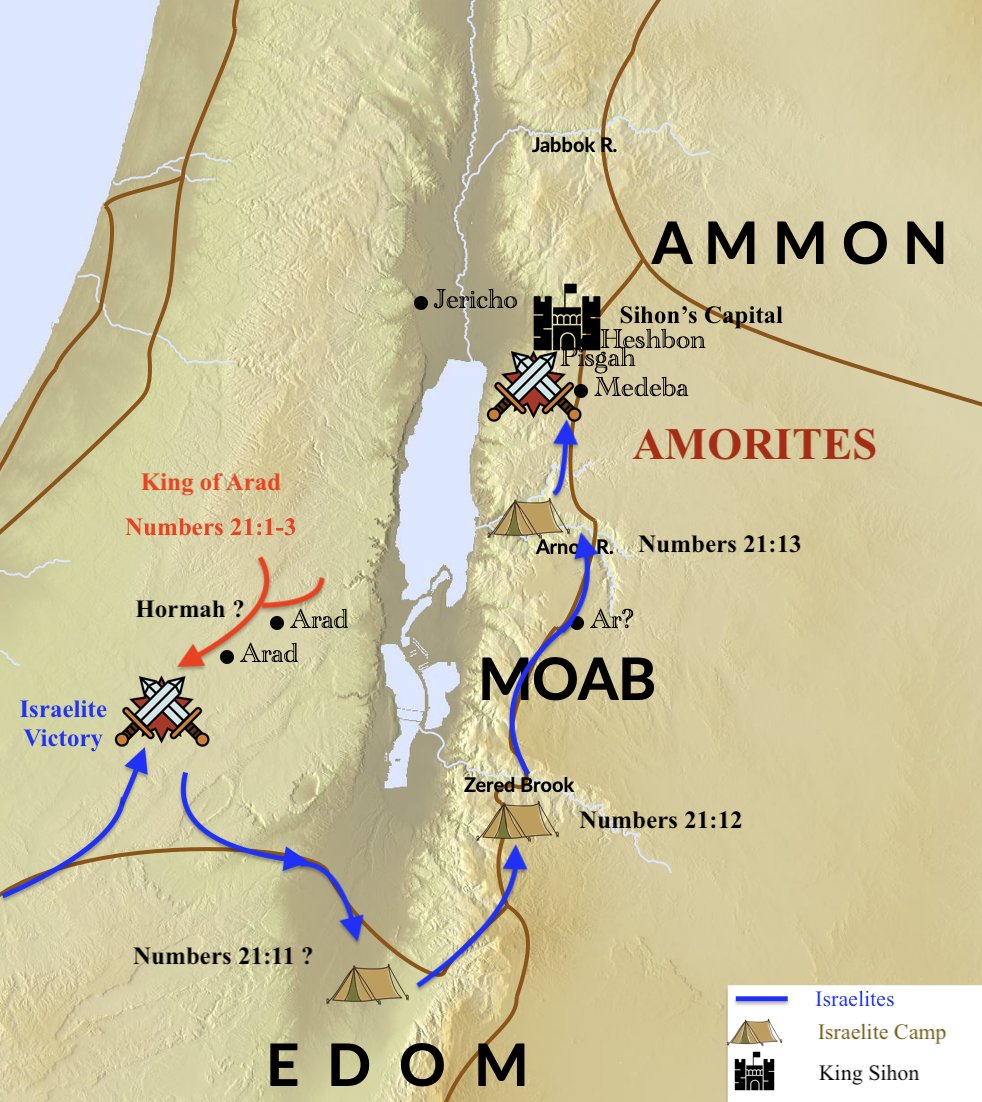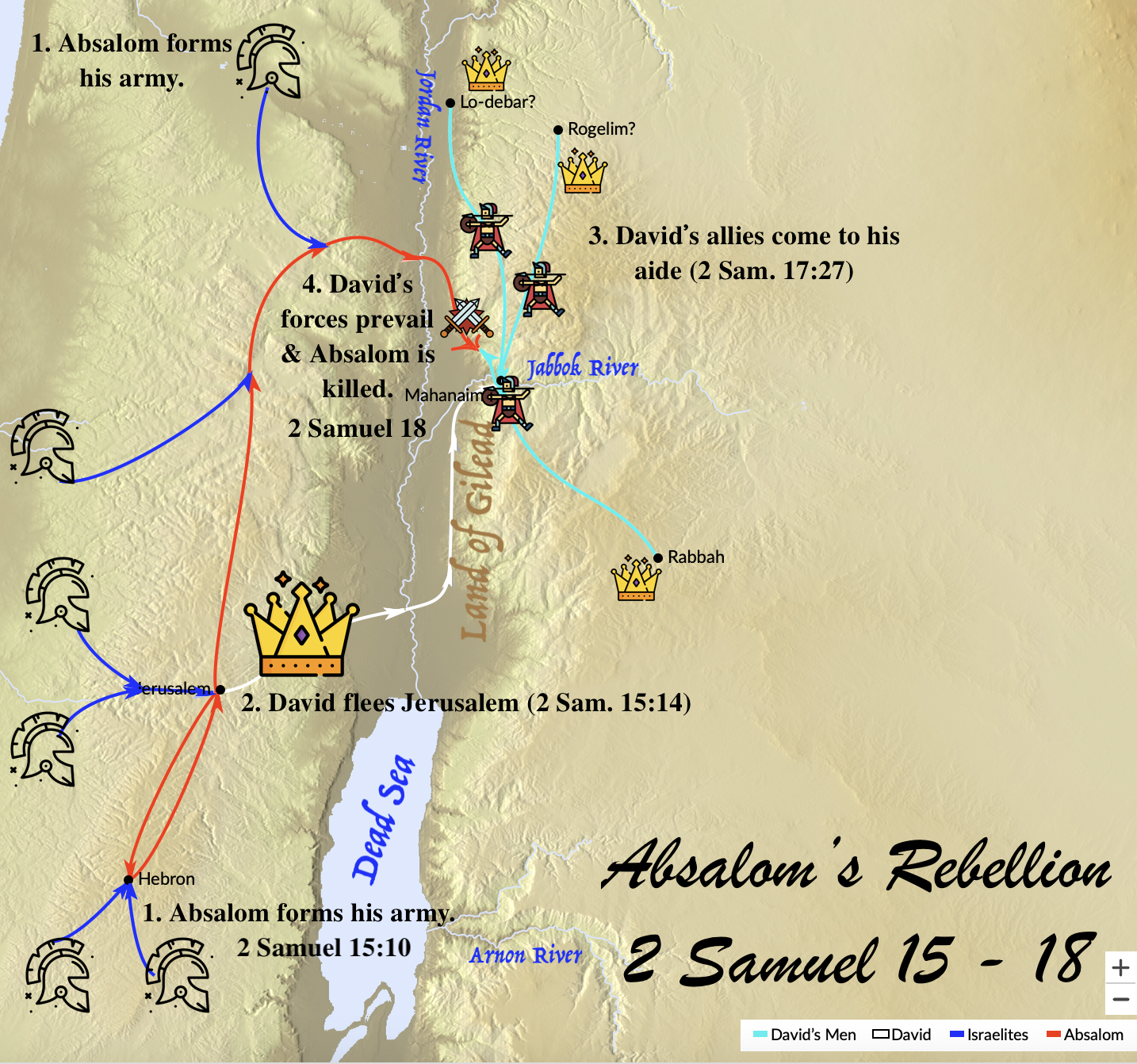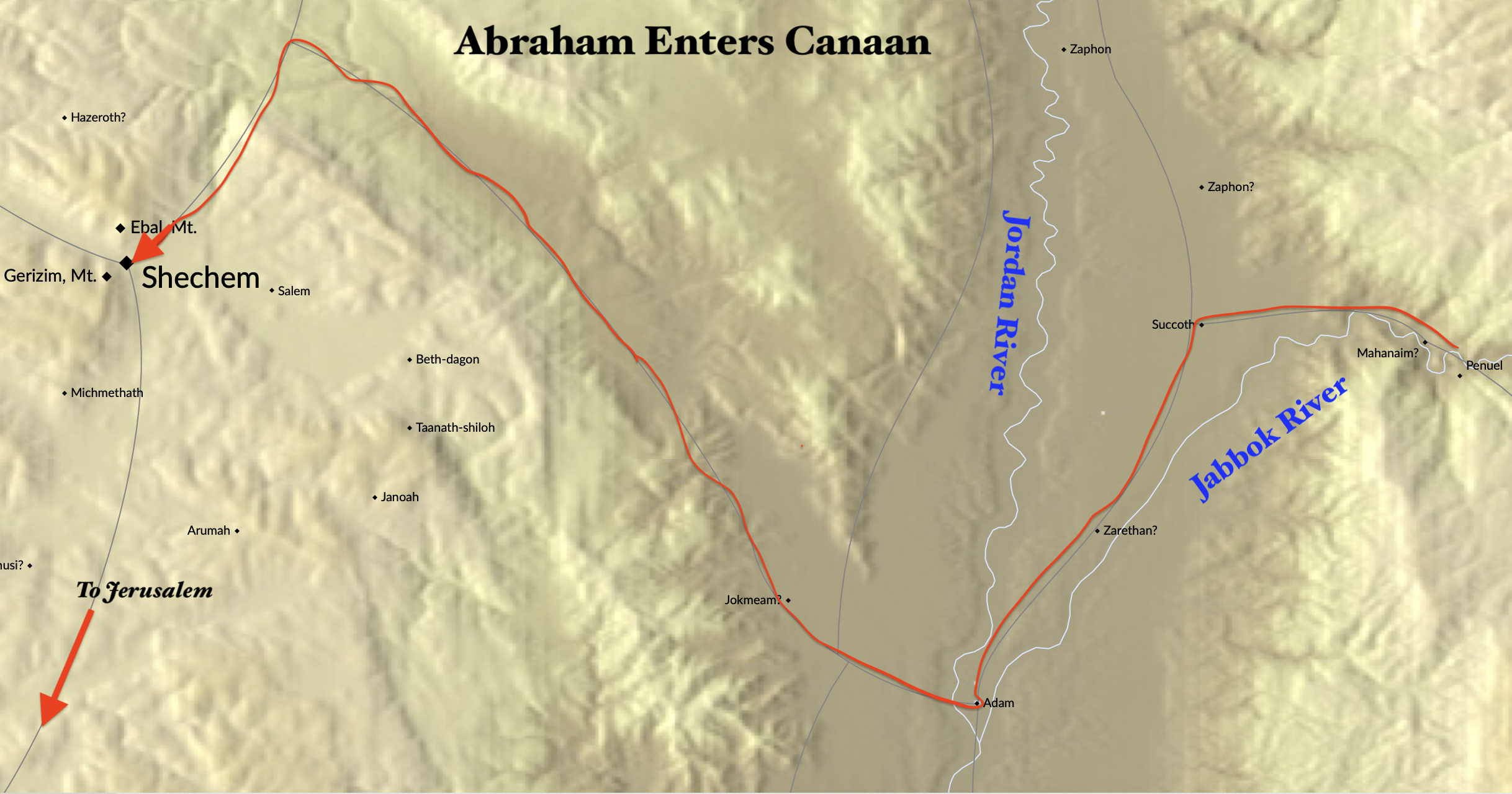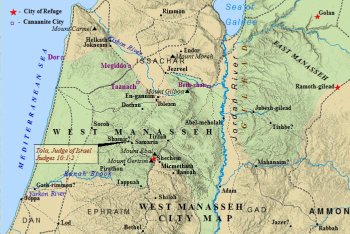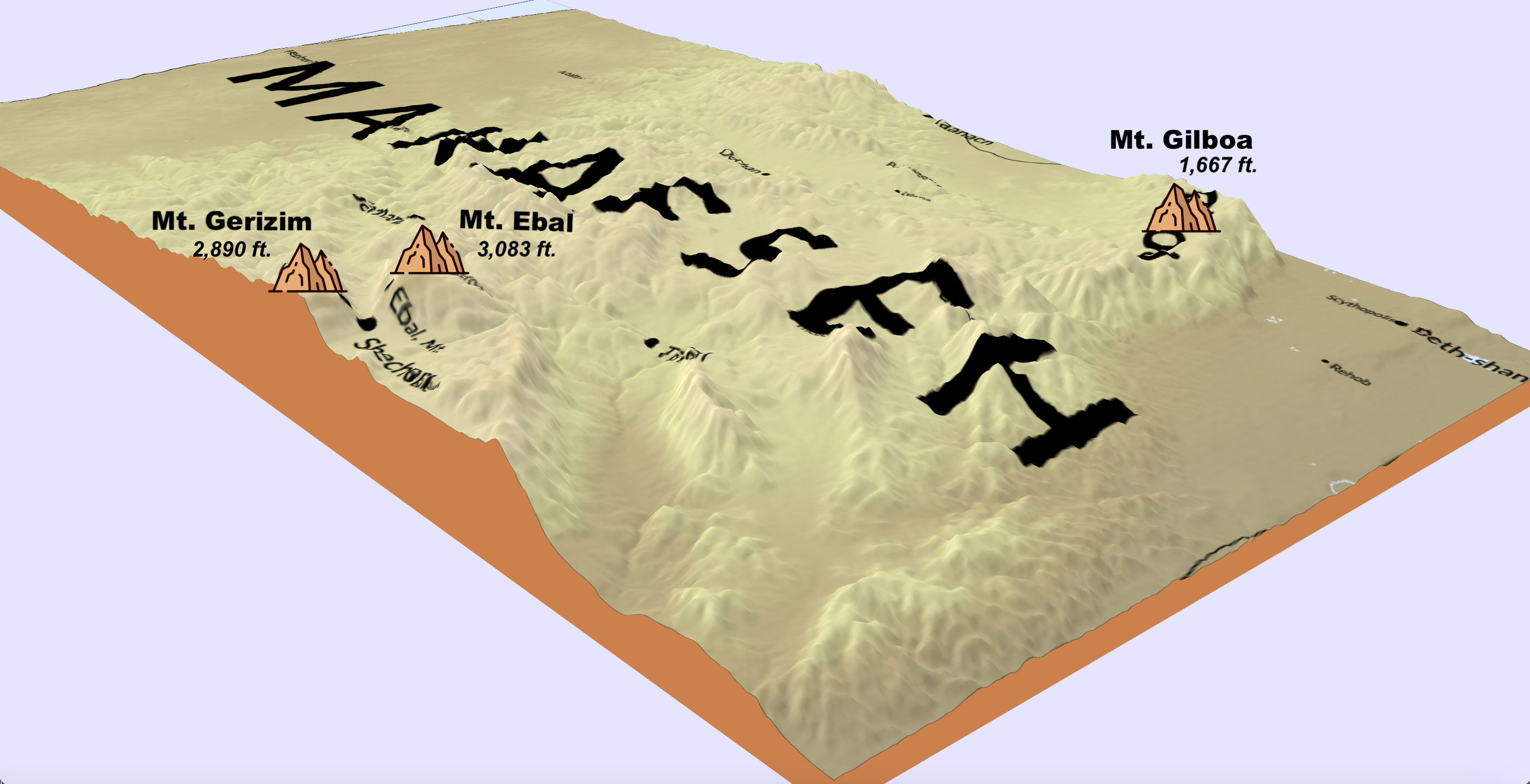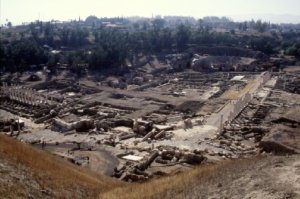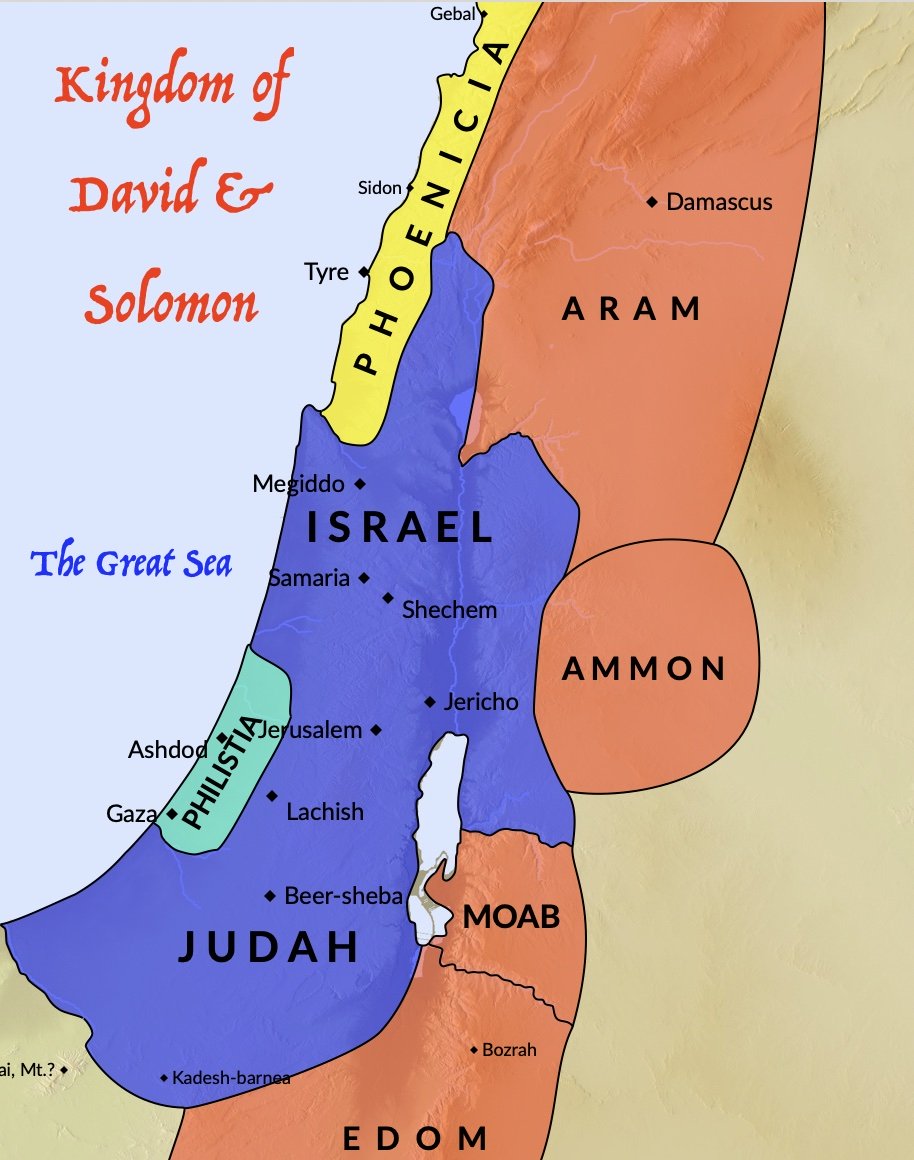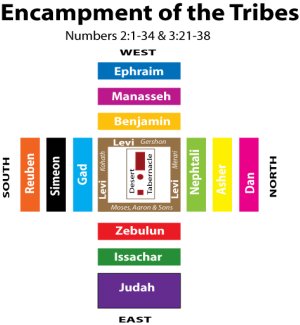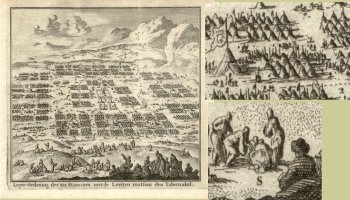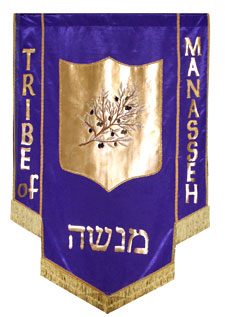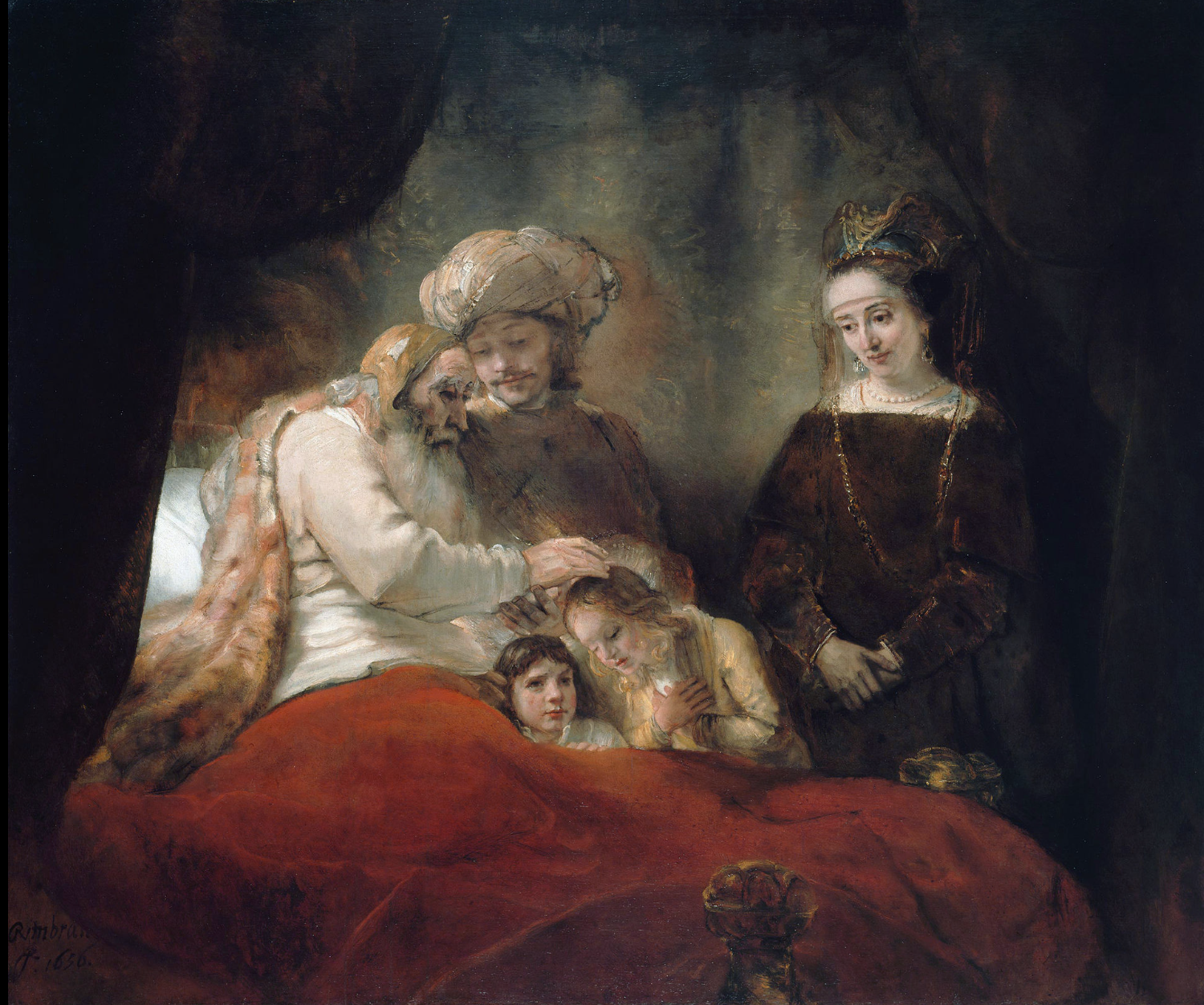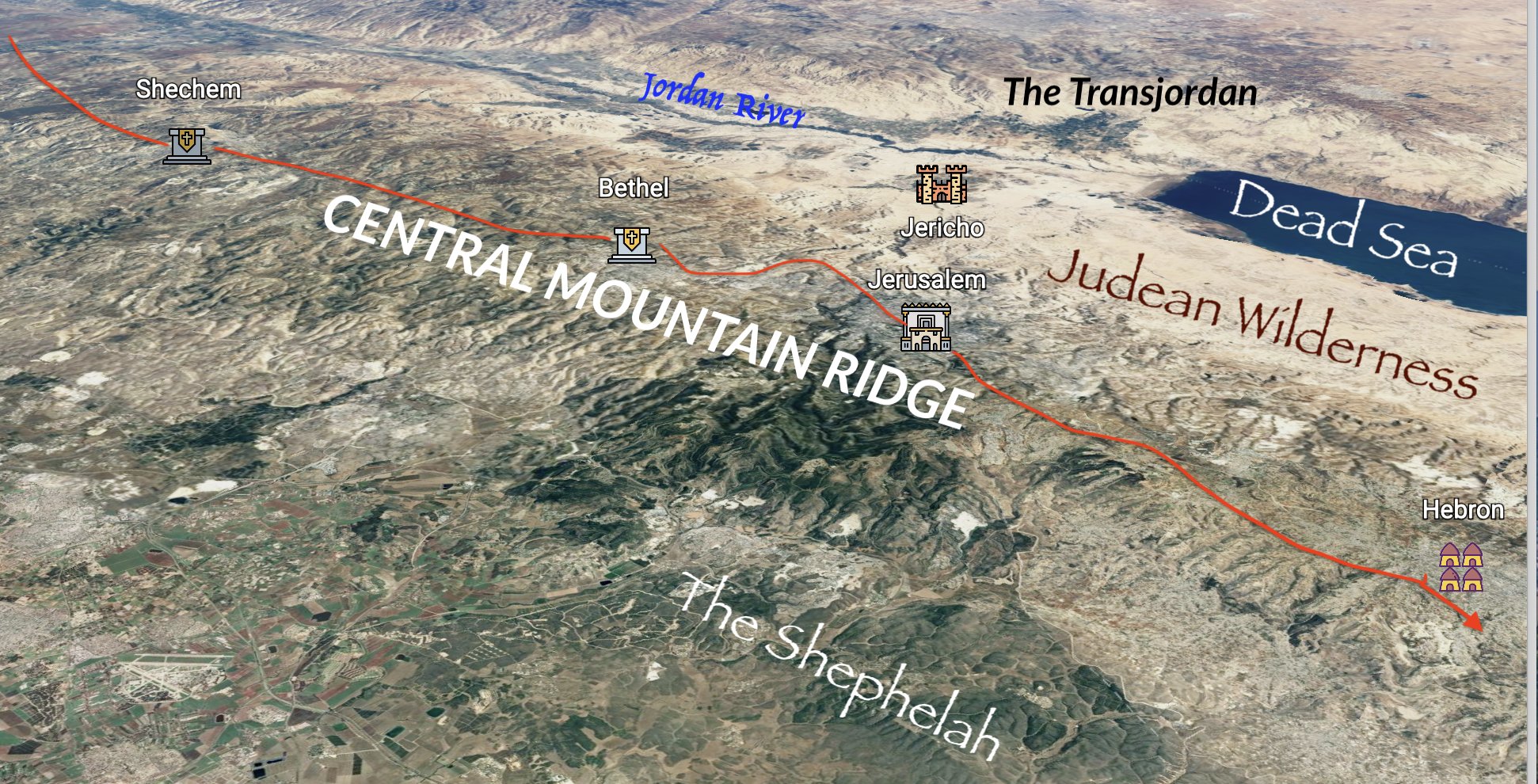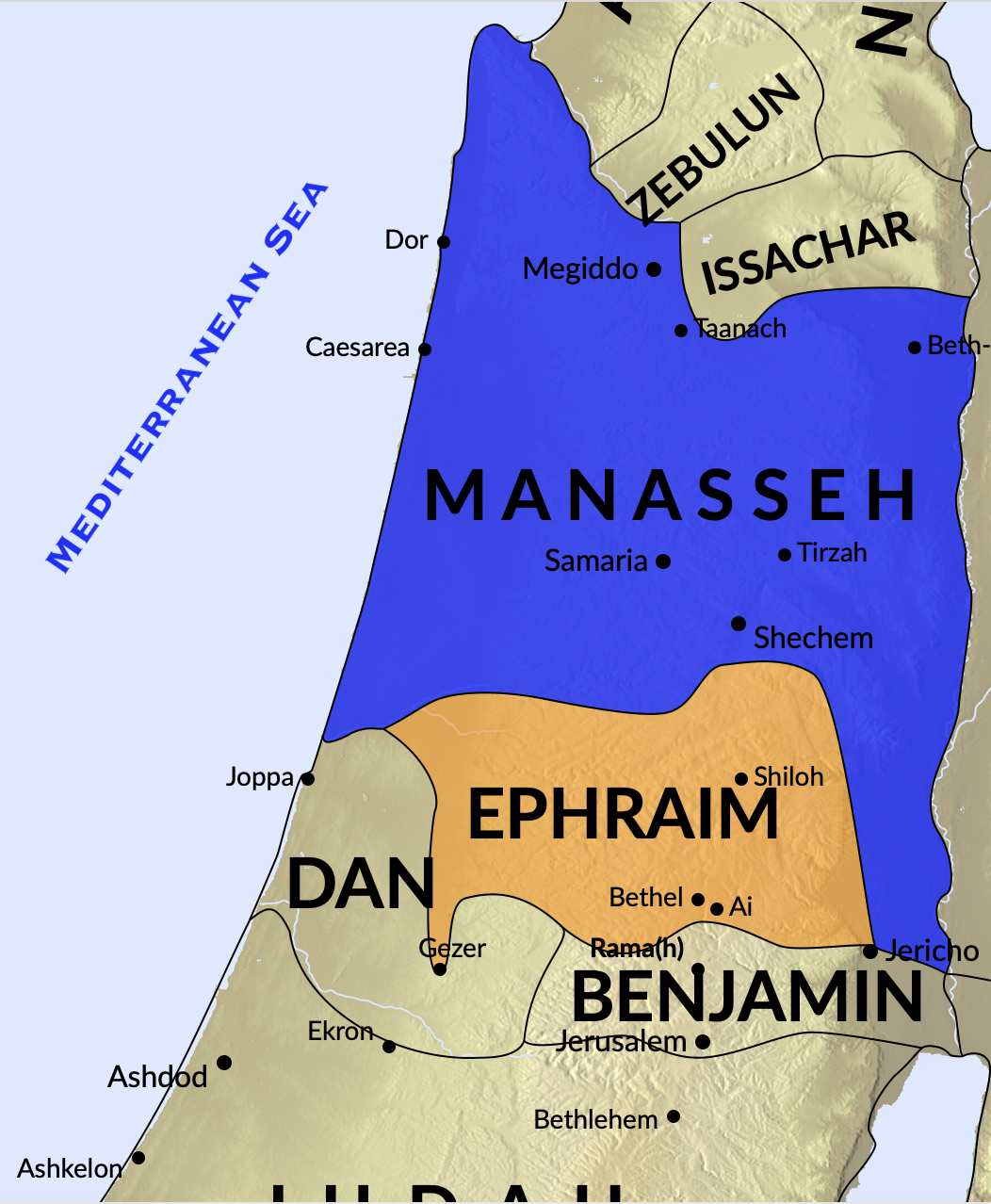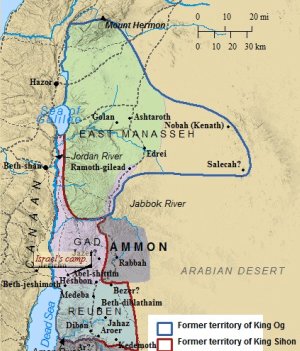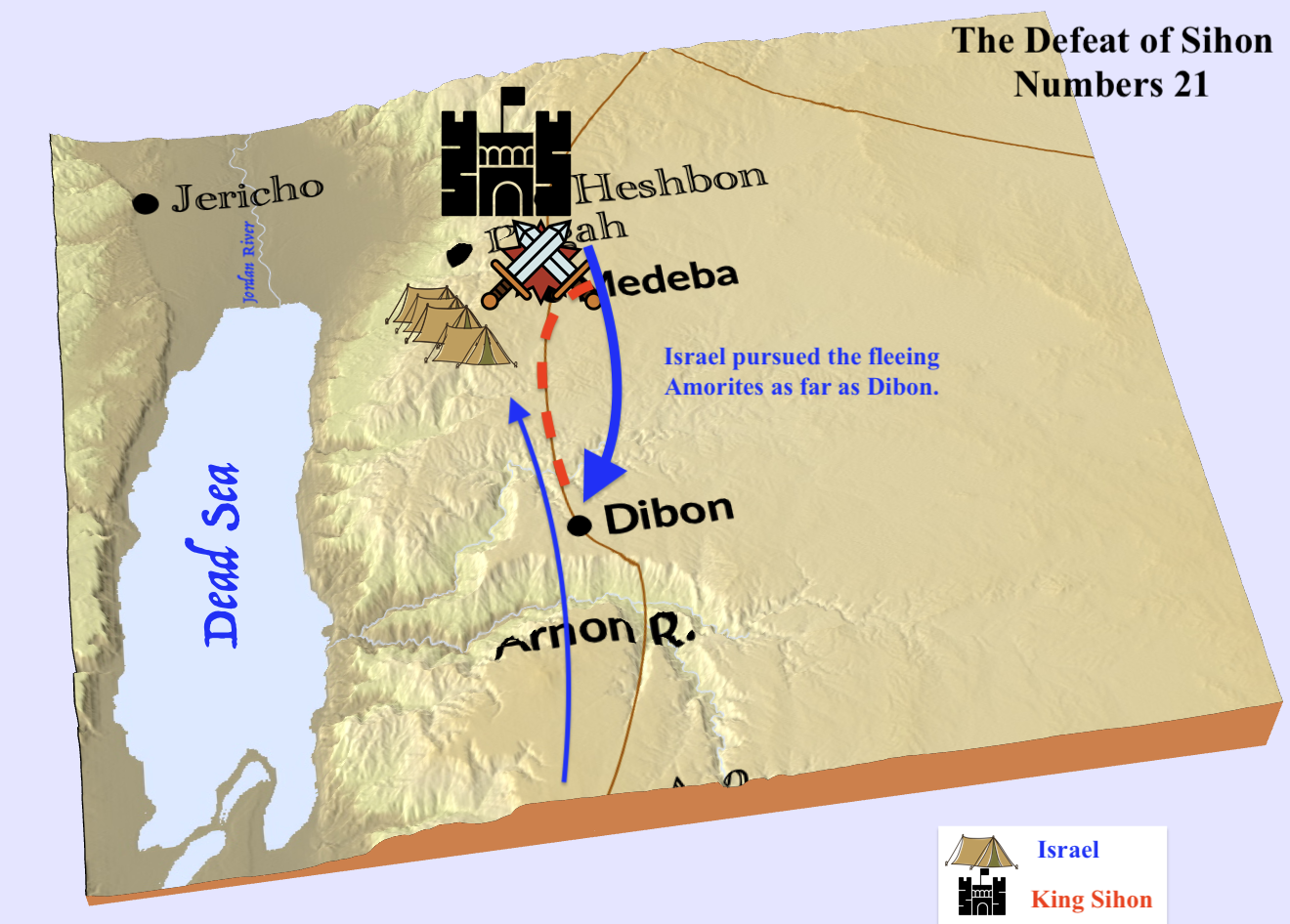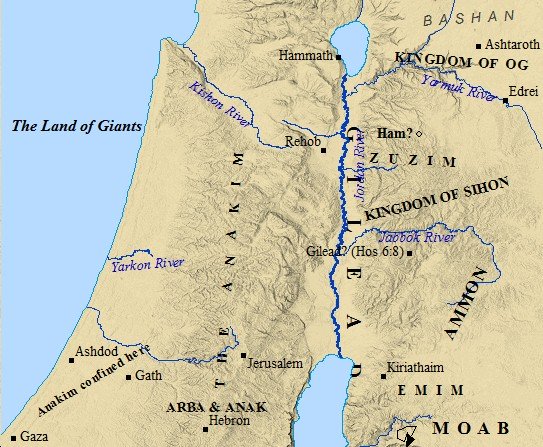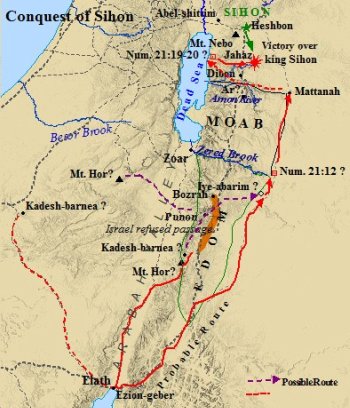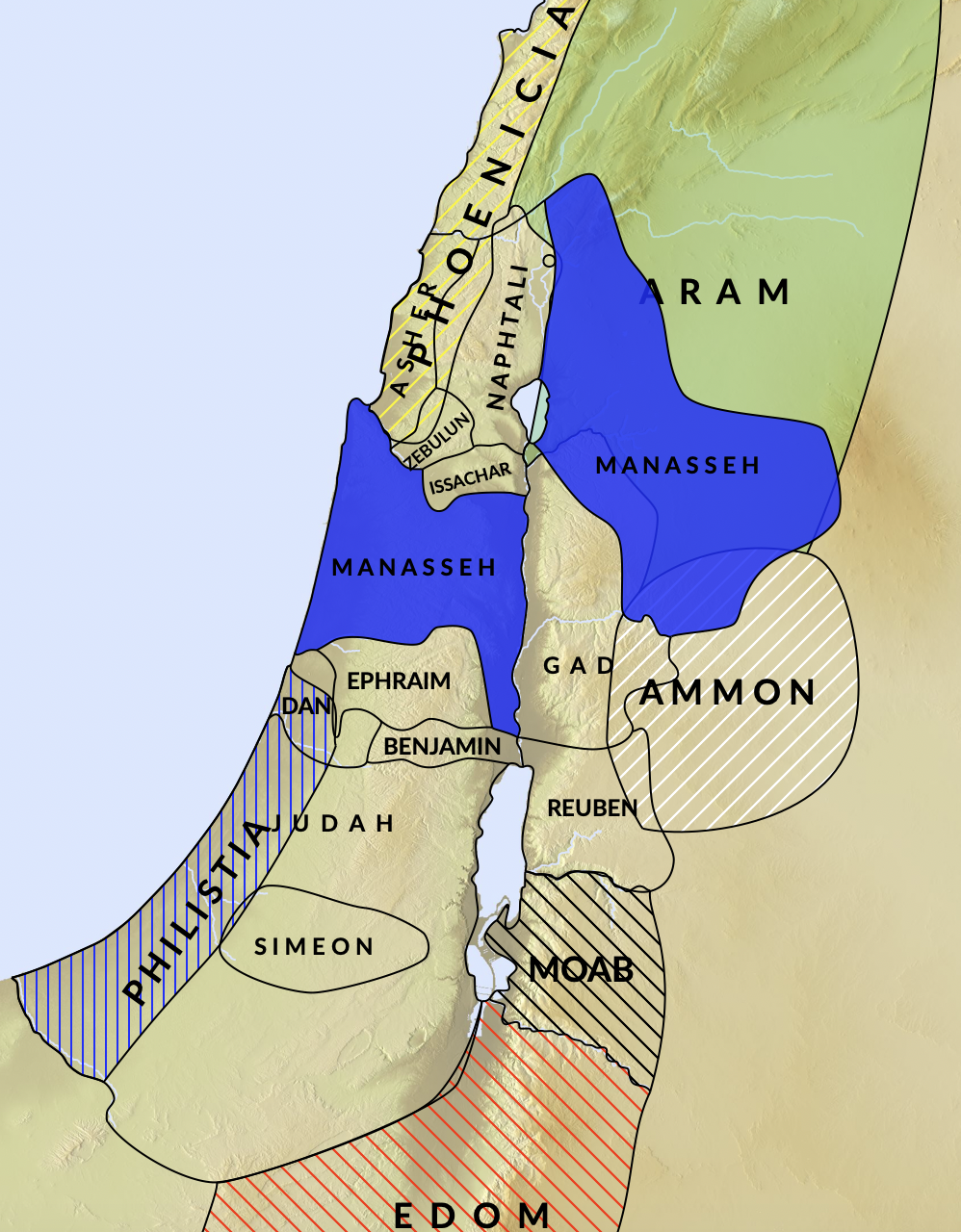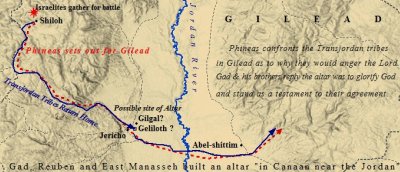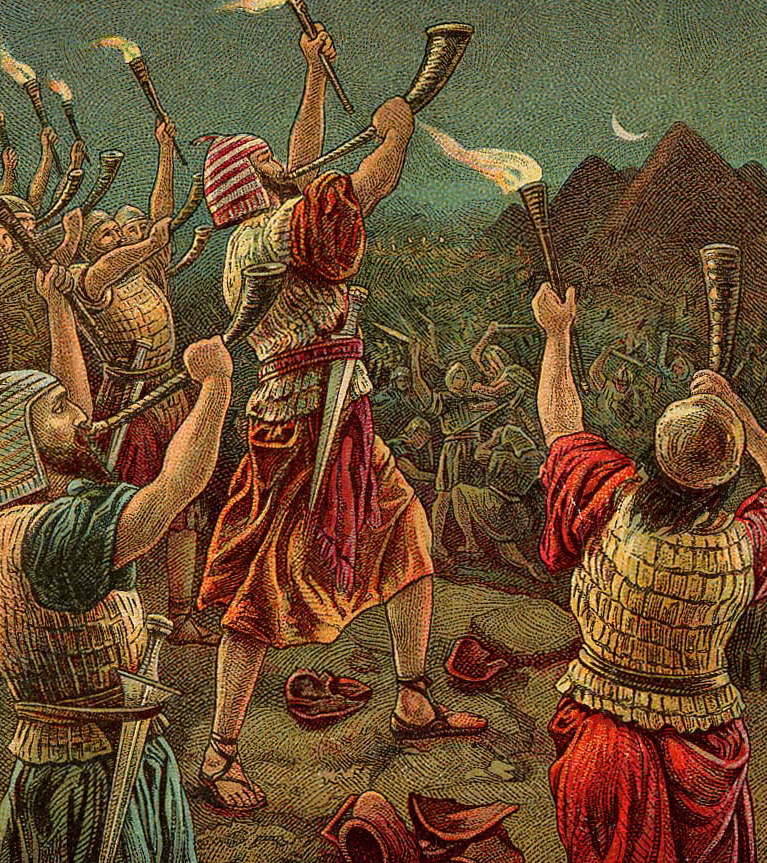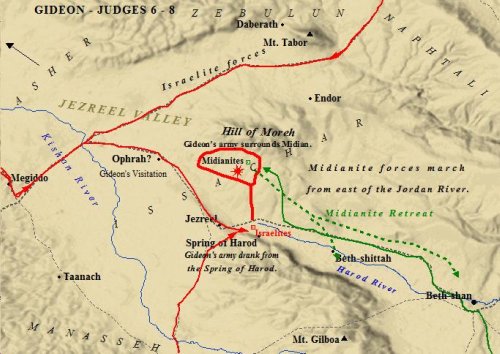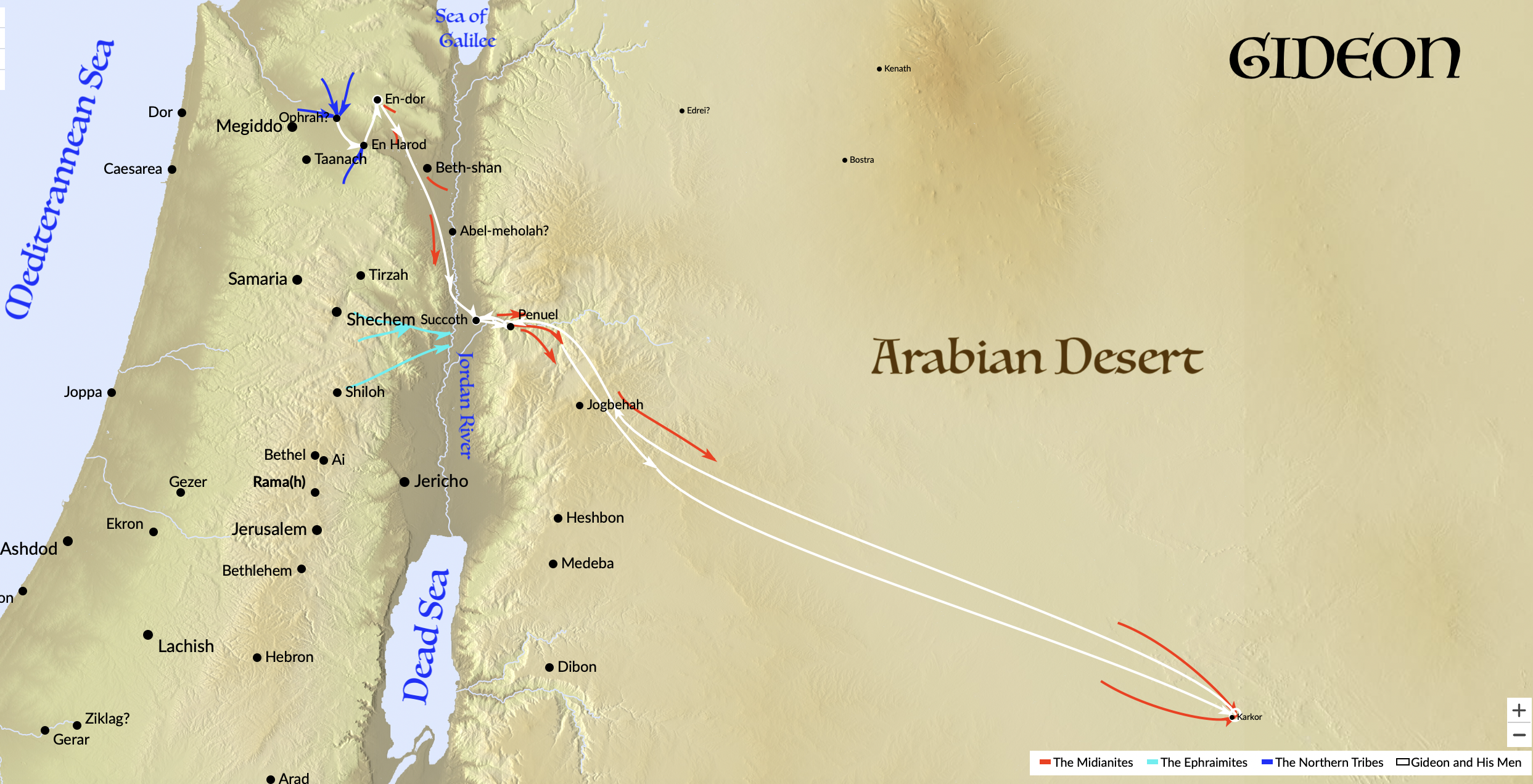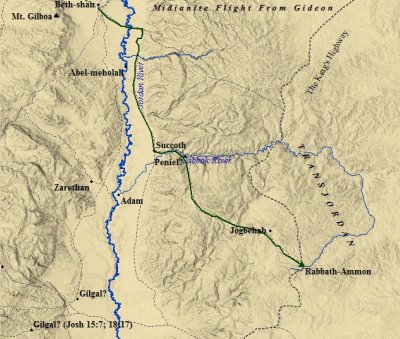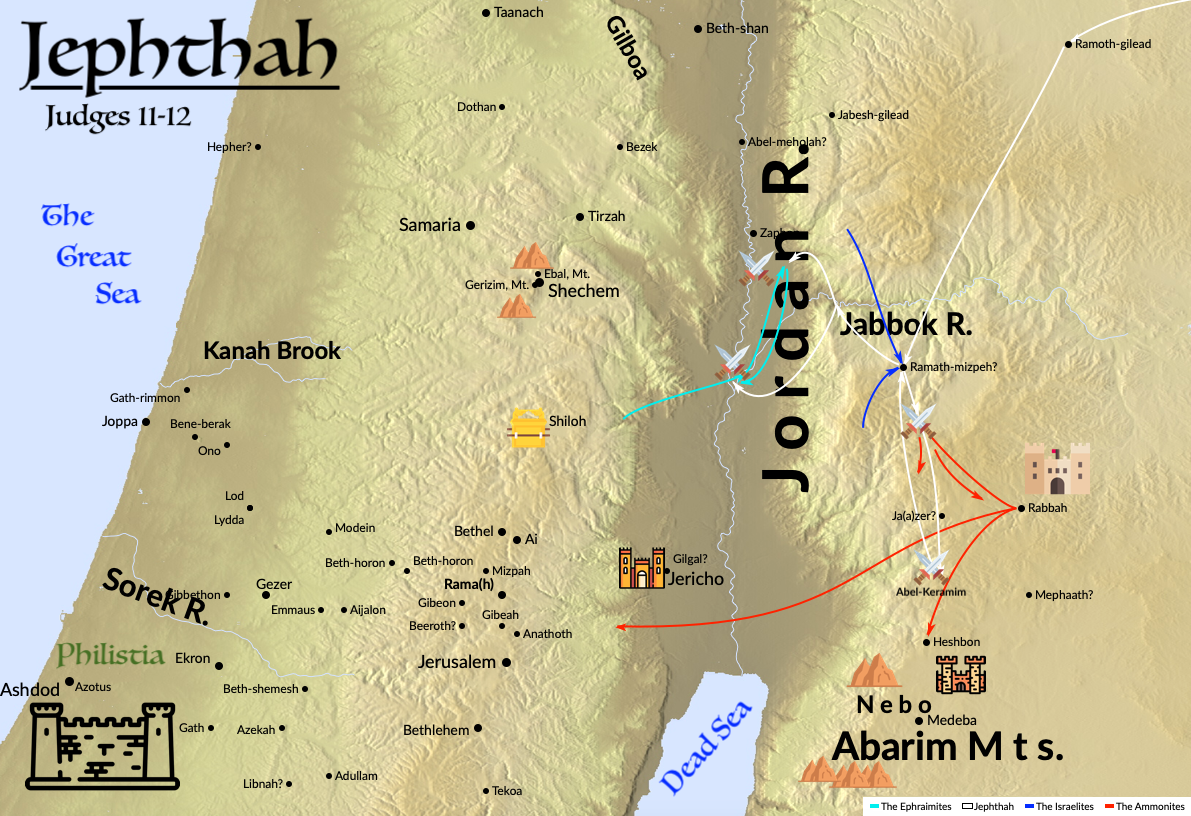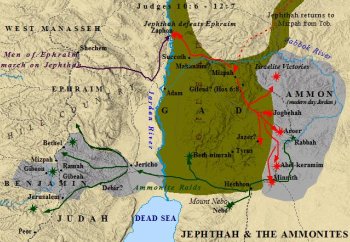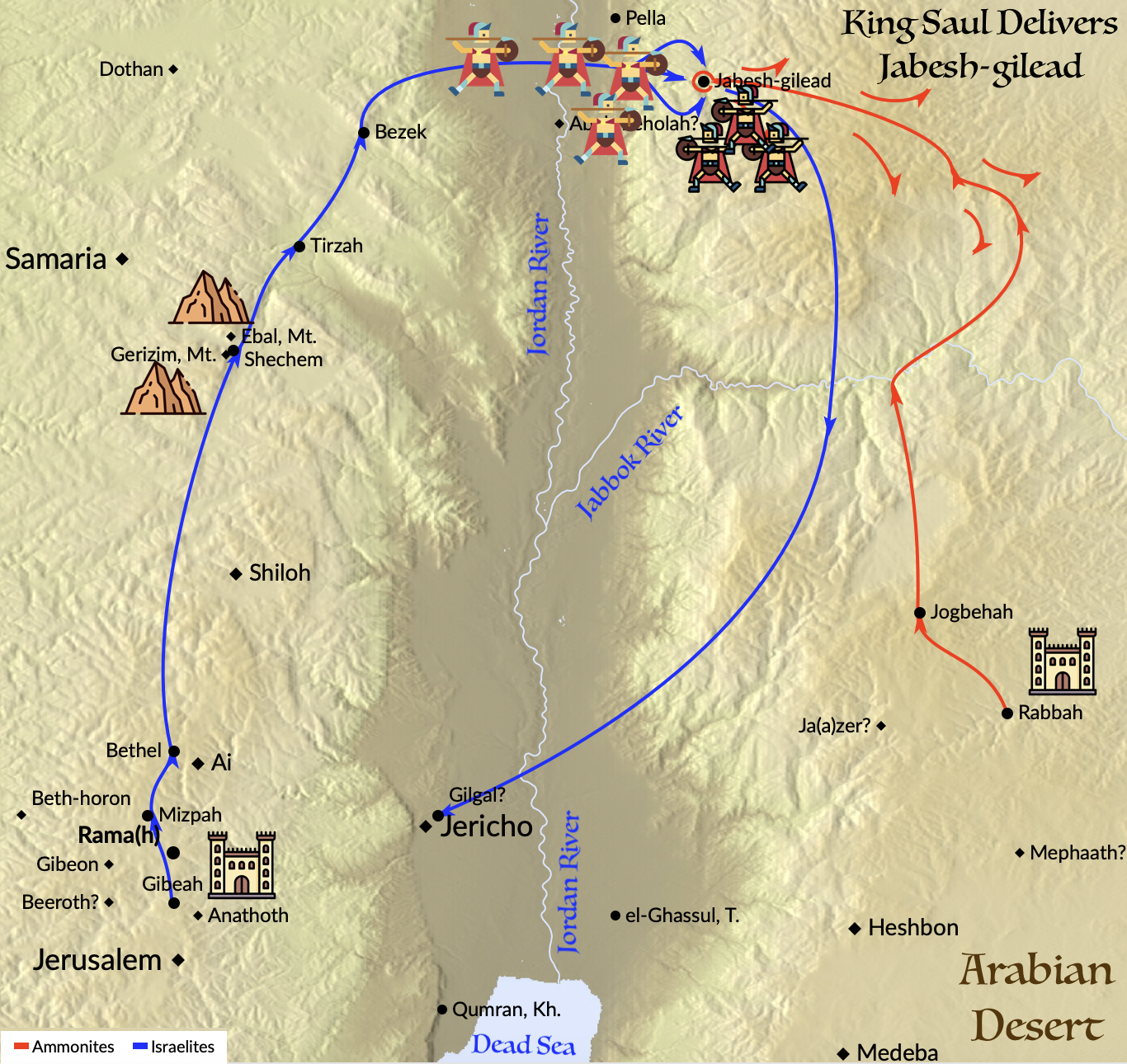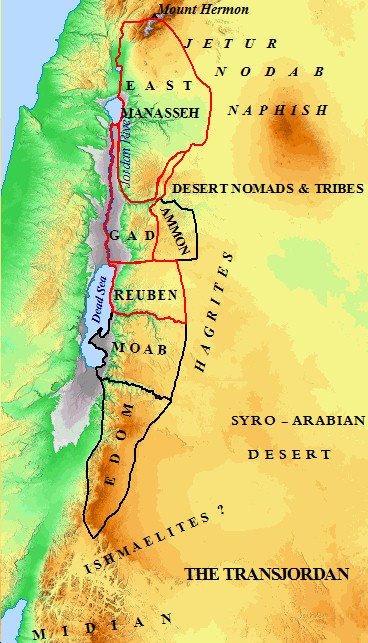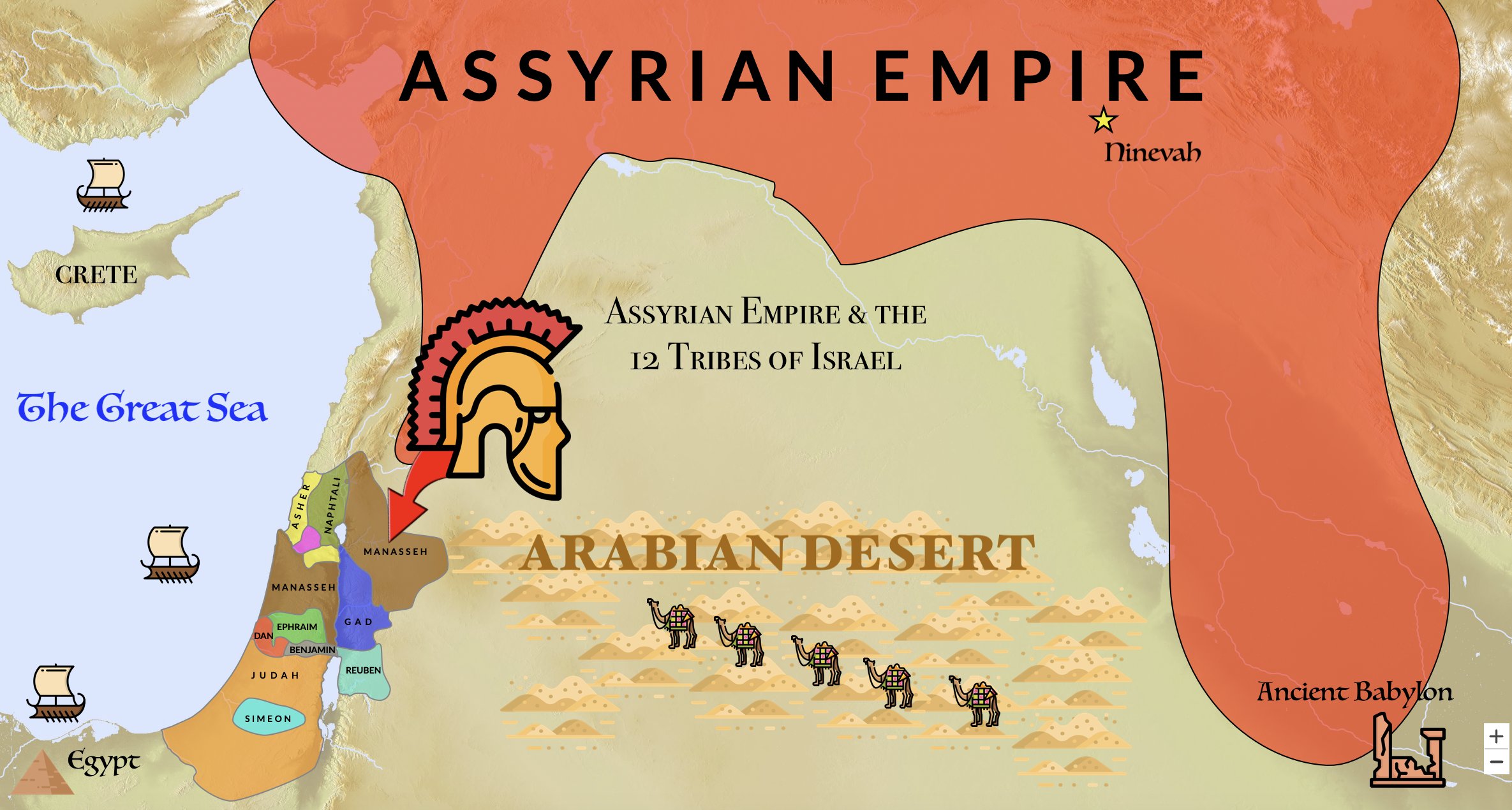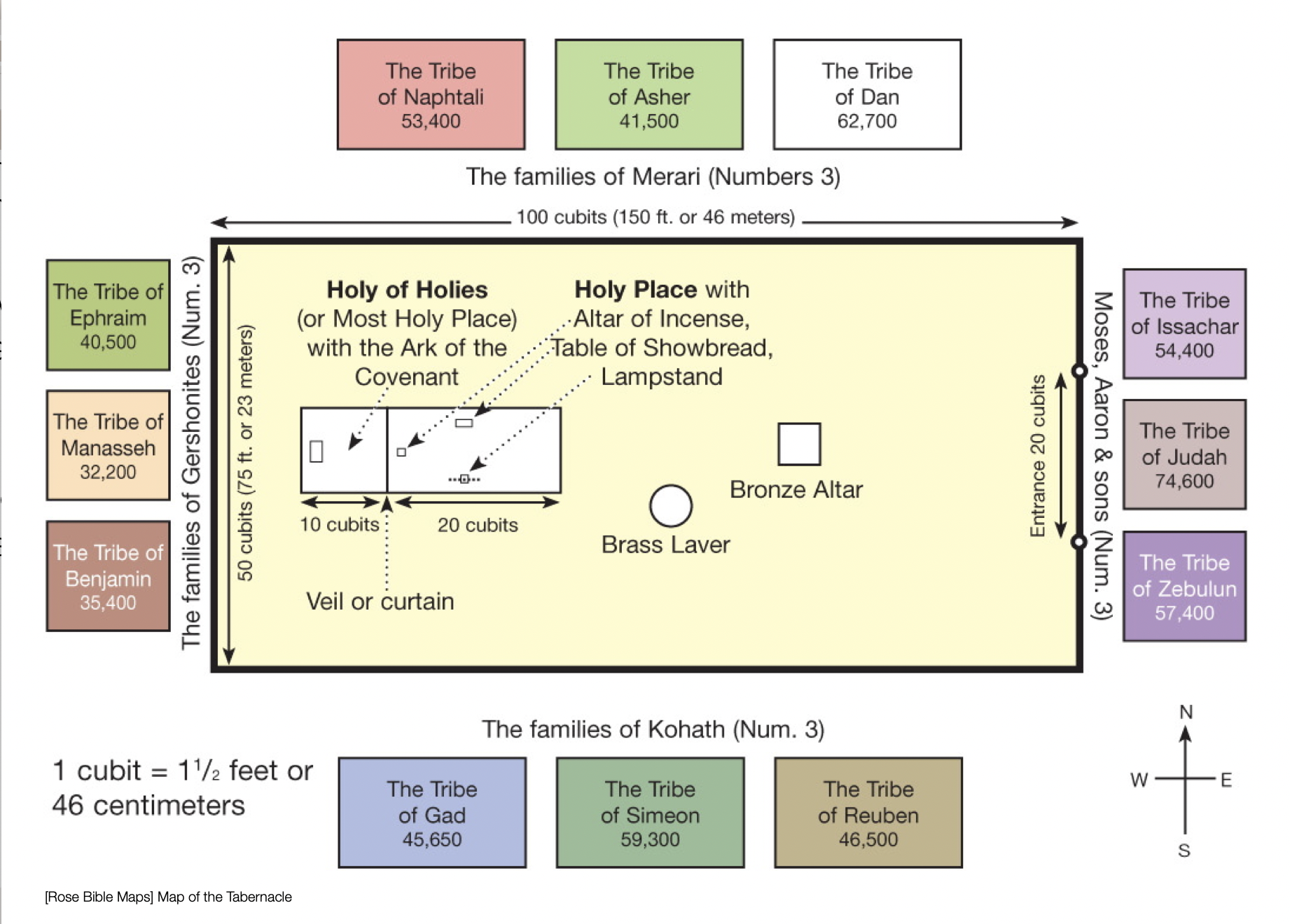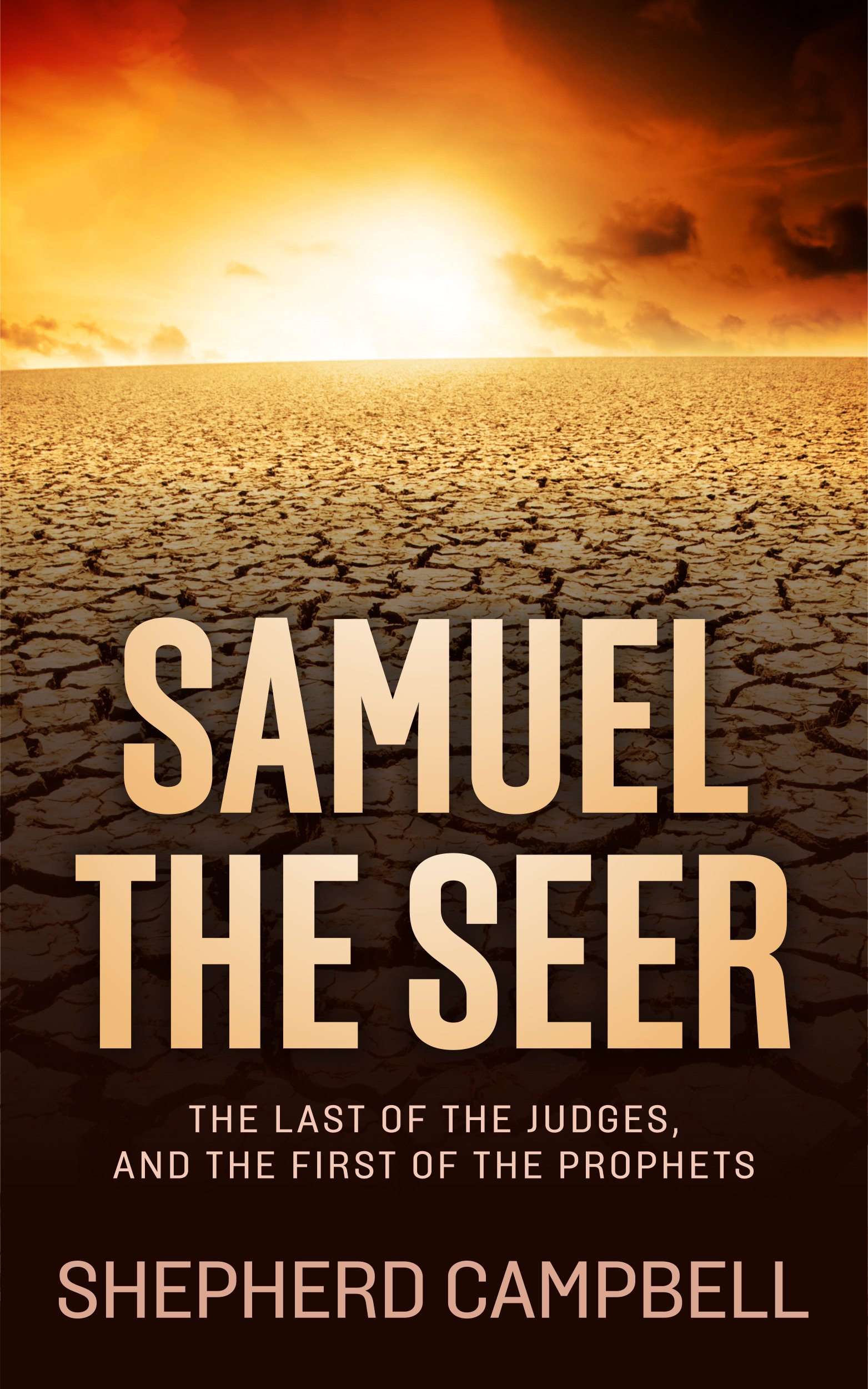VISIT OUR FACEBOOK PAGE!
The Tribe of Manasseh
The Blessings of the Tribe of Manasseh
Jacob's Blessing - Genesis 48:20
"And he blessed them that day, saying, 'By you Israel shall pronounce blessing, saying "May God make you like Ephraim and Manasseh!" Thus he put Ephraim before Manasseh."
Moses Blessing - Deuteronomy 33:17 "As the first born of his ox, majesty is his, And his horns are the horns of the wild ox; With them he shall push the peoples, All at once, for the ends of the earth. And those are the ten thousands of Ephraim, and those are the thousands of Manasseh."
The Land
As the first born of Joseph, Manasseh received the double portion of the inheritance, despite Ephraim's greater blessing of influence and prosperity. The tribe of Manasseh received a double portion of land upon Israel's conquest. Manasseh received land in the Transjordan, east of the Jordan, and a large portion of land on the west of the Jordan.
The tribe of Manasseh, thus, was the only of the 12 tribes of Israel to receive an inheritance on both sides of the Jordan River. The double portion of Manasseh's rightful inheritance as first born son was manifested in the double portion of land allotted the tribe of Manasseh.
Hence it is necessary, when discussing the inheritance of the tribe of Manasseh, to think in terms of East Manasseh and West Manasseh. East and West may be used to denote each side throughout this article. According to Scripture, the first inheritance for the tribe of Manasseh was handed out east of the Jordan, to East Manasseh in the Transjordan. However, the heartland of the northern kingdom of Israel would be found west of the Jordan, in the tribal territory of West Manasseh.
East Manasseh
The first allotment of land was given in the Transjordan by Moses himself. It was given to the tribes of Reuben , Gad , and East Manasseh as spoil of war. The Israelites had just defeated the Amorite/Rephaimite/ Nephilim brother kings of Og and Sihon.
To the tribe of Manasseh in the east was given all of the former kingdom of King Og. This area was known as Bashan. The allotment of East Manasseh's land is brief in Scripture. The Holman Bible Atlas points out the border description of East Manasseh is primarily construed from town lists. Though multiple passages exist in Scripture concerning the allotment of the eastern half-tribe of Manasseh, each is brief and somewhat vague, focusing on a different aspect of the land allotment. These passages can be found in Numbers 32:39-41, Deuteronomy 3:13-15, Joshua 13:29-31, and I Chronicles 2:21-23.
These passages shed light on why the tribe of Manasseh received these lands east of the Jordan. It becomes evident that East Manasseh was settled primarily by two clans within the tribe of Manasseh.
Numbers 32:39-41 describes the foundation of the eastern half-tribe of Manasseh.
"And the sons of Machir the son of Manasseh went to Gilead
and took it, and dispossessed the Amorites who were in it. So Moses gave
Gilead to Machir the son of Manasseh, and he lived in it. And Jair the
son of Manasseh went and took its towns, and called them Havvoth-jair.
And Nobah went and took Kenath and its villages, and called it Nobah
after his own name."
Based on this passage, it would seem that Machir, the eldest son of Manasseh, drove out the Amorites from Gilead. Seemingly this would have occurred after the destruction of Og at Edrei, thus weakening all of Bashan. Machir, thus, dwelt in Gilead, as Moses granted to him the land he had cleansed. We see a similar situation with Caleb and Moses in Joshua 14. Jair and Kenath seemed to have settled in the land north of Gilead, called Bashan.
Scripture makes it plain the kingdom of Og was vast, including both the territory within Bashan and Gilead. The kings Og and Sihon had basically ruled the entire Transjordan. Now, Bashan was settled by the sons of Jair and Kenath, whilst Gilead was settled by the sons of Machir. This division is further seen in the description of the allotment found in Joshua 13:29-31.
"Moses also gave an inheritance to the half-tribe of Manasseh; and it was for the half-tribe of the sons of Manasseh according to their families. And their territory was from Mahanaim, all Bashan, all the kingdom of Og king of Bashan, and all the towns of Jair, which are in Bashan, sixty cities; also half of Gilead, with Ashtaroth and Edrei, the cities of the kingdom of Og in Bashan, were for the sons of Machir the son of Manasseh, for half of the sons of Machir according to their families."
The words of Moses clearly set forth the demarcation of land east of the Jordan in Deuteronomy 3:14-15.
"Jair the son of Manasseh took all the region of Argob as far as the border of the Geshurites and the Maacathites, and called it, that is, Bashan, after his own name, Havvoth-jair, as it is to this day. And to Machir I gave Gilead."
Jon Bright, in his book A History of Israel, claims the tribe of Manasseh may have been further broken into two distinct clans; those of Machir and Gilead. He states Deborah's verse in The Song of Deborah from Judges 5 as evidence of this. In this passage, Deborah praises the commanders "from Machir" which assisted Barak. Conversely, Gilead was chastised for "remaining across the Jordan". Thus, the two distinctions of Gilead and Machir within the tribe of Manasseh find themselves in some of Israel's earliest literature.
I Chronicles 2 lends further insight into the family of Machir. It becomes plain Machir was a great man. He was a great warrior, responsible for cleansing the land from the mighty Amorite. He was also the father of Gilead, from whom the region of land would take its name. Machir also had at least one daughter.
"Afterward, Hezron went in to the daughter of Machir the father of Gilead, whom he married when he was sixty years old; and she bore him Segub. And Segub became the father of Jair, who had twenty-three cities in the land of Gilead."
Thus Machir's daughter was given in marriage and produced another male, Segub, who grew to be a great man as well. It is interesting to take note of the family name, Jair being handed down to the next generation. Uncle Jair occupied the cities in Bashan, however, this Jair, the son of Hezron, from the daughter of Machir, chose to settle in Gilead. He ruled over twenty-three cities. The tribe of Manasseh in the east was primarily settled by the clans of Jair and Machir, or so Scripture seems to indicate. Gilead's descendants would rise to prominence as well.
These passages also make it clear the land of East Manasseh was further divided into two sub-sections, or, regions. These are known as Bashan and Gilead. Bashan, as Adams pointed out, "included all of the tableland south of Mount Hermon to the river Yarmuk". The western border of Bashan was the Jordan River and Sea of Galilee. The eastern border, for all practicality, ended at the ancient natural fortress of Edrei, and dissipated into the fringes of the imposing and majestic Arabian Desert.
Bashan was formed of hard limestone (Adams, 76), and volcanic deposits. Rainfall was significant, as Bashan received twenty to forty inches per year. Bashan rose sharply above the Jordan Rift Valley below, thus clouds formed in the higher altitudes of Bashan. Elevation in the Transjordan ranged from 2, 000 to 5, 000 feet above sea level. Frequent showers dropped on the hard limestone (Holman Bible Atlas, 23) as a result of its higher elevation.
Volcanic cones, long since inactive, frequently jut from the surface. The tableland gradually slopes in the east, merging with the Arabian Desert. The tribe of Manasseh seldom controlled Bashan after the United Monarchy. The Arameans, especially those in Damascus, oftentimes invaded Bashan and threatened the Israelites in the Transjordan.
Edrei was the fascinating capital of Og, and an ancient city formed of natural volcanic activity. It was an impregnable fortress of nature. Scholars point out the natural security of Edrei's volcanic formed walls. The city consists of clefts and crevices. Many of the ancient houses still stand, a result of the walls, ceilings and doors, for the most part, being completely made of stone. The city itself sat twenty feet above the plain; hence it was a naturally formed volcanic and rock fortress towering above the surrounding countryside. The most fascinating element of this mysterious city, however, is the city built underground, beneath the imposing fortress towering above ground. Many feel it was hollowed out as a refuge for those living above, though this is not known for certain. The precise function of this underground city remains shrouded in wonderful mystery.
Perhaps it is no coincidence that Og and Sihon, the last of the Rephaim , also connected to the Nephilim, also shrouded in mystery, dwelt in such a fortified city with a mysterious underground city as well. It is quite remarkable, when viewed in this context, that the Israelites, led by the men of the tribe of Manasseh, defeated the mighty King Og. These were giants, fierce warriors. The Jews, likely, were much, much smaller people. Edrei was a mighty capital for a mighty king. God used the foolish, small, and insignificant of the earth to shame the mighty and proud.
The tribe of Manasseh in the south bordered the northern limits of the tribe of Gad. East Manasseh reached from its southern border, generally associated with the Yarmuk River, to the foot of Mount Herman, towering over 9, 000 feet high in the north. J. McKee Adams sheds light on the fact the Yarmuk is never mentioned in the Biblical narrative (Adams, Biblical Background 98). Scholars have noted this is strange, as the Yarmuk was one of four chief streams in the Transjordan.
Regardless, the tribe of Manasseh was well watered. The soil, consequently, is some of the richest in all of the Near East. From ancient times the land has attracted farmers and herdsmen. The prophets of Amos and Ezekiel refer to the well-fed cattle occupying Bashan in Old Testament times. Golan was another chief city of East Manasseh, as it was identified as a City of Refuge for the manslayer.
The tribe of Manasseh, as previously stated, also inherited the land of Gilead. Many famous Old Testament exploits took place in Gilead, and by the hands of Gileadites. These were mighty people, and produced some of Israel's most heroic men. Men such as Jephthah, Saul, Elijah and David are connected to Gilead and spent significant amounts of time in the land east of the Jordan. David fled Jerusalem to Gilead during the rebellion of his son Absalom.
South of the Sea of Galilee, the Yarmuk River signaled the beginning of Gilead. It continued southward to the Dead Sea. Thus, in broad terms, Gilead stretched from the Sea of Galilee in the north, to the Dead Sea in the south. In stricter terms, Gilead stretched from the Yarmuk River in the north, to Heshbon in the south (Adams, 76). It is dominated, as Adams indicated, by a mountain range varying from 2,000 - 2,500 feet in elevation. In antiquity the region was heavily forested.
The Jabbok River, south of the Yarmuk, split Gilead in two. The tribes of Gad and Manasseh occupied the region. The Wadi Farah connected Gilead with the west, thus the tribe of Manasseh remained connected, though divided. The land was significant from the beginning. Abraham entered Canaan via the Wadi Farah. The wadi is located opposite the Jabbok River, on the west side of the Jordan River.
As Abraham traveled southwest from Aram-naharaim, his party would have descended the banks of the Jabbok into the Jordan River valley. He and his family would have then ascended upward along the banks of the Wadi Farah into the heartland of Canaan. After his entrance into the Promised Land, he stopped in nearby Shechem and built an altar to God Almighty. Thus began the formation of God's people into a nation.
Southeast of Gilead was the kingdom of Ammon. Their capital was in Rabbah. These names find their modern equivalents in the form of Amman, Jordan. In fact, the ancient ruins of Rabbah remain today in Amman. The two lands, and people, have been in contact for over three thousand years. At times they were at peace with each other, at times at war. The story continues to this day.
Gilead primarily consisted of wooded terrain, streams and creeks, and pastures. Thus, it is easy to understand why the men of Gad, Reuben, and Manasseh sought out the land for their extremely large herds. They were herdsmen, and recognized grazing land when they saw it. Upon the defeat of Og and Sihon, representatives from the tribe of Manasseh, as well as Gad and Reuben, approached Moses in the opening verses of Numbers 32.
They were given the land, on the condition they continue to march across the Jordan, and lead the way into Canaan for the rest of their Israelite brethren. As will be seen, the tribe of Manasseh more than fulfilled their obligation to Moses and God. Moses instructed these men that upon fulfillment of their vow, they could return to their families and herds in the east.
West Manasseh
The tribe of Manasseh received an inheritance west of the Jordan River which would come to shape the interior of Israel. Their inheritance was given by Joshua at the second allocation of the land at Gilgal. This allocation accommodated the tribe of Ephraim , the tribe of Manasseh (West Manasseh), and the tribe of Judah .
It took place after the successful completion of the southern campaign. These were the interior tribes of Israel. After the Assyrian destruction and exile of the northern kingdom of Israel, the area would be re-named Samaria. These three tribes, thus, occupied the heartland of the United Monarchy.
This is significant because it was left up to the three most
influential tribes at the time to settle the land. The tribes of Judah
and Ephraim carried significant influence. However, the tribe of
Manasseh was also singled out by Joshua as a mighty tribe. The House of
Joseph, Ephraim and Manasseh, was extremely influential throughout the
12 tribes of Israel. Joshua had this to say to them in Joshua 17:17;
"And Joshua spoke to the house of Joseph, to Ephraim and Manasseh, saying, "You are a numerous people and have great power; you shall not have one lot only..."
On the west side of the Jordan, by order of God through Moses and Joshua, the land allotted for Joseph was divided into two portions. One portion was for the tribe of Ephraim, the youngest of Joseph's sons. This was in fulfillment of Jacob's adoption of Joseph's sons in the waning chapters of Genesis. The other portion was for the tribe of Manasseh, the eldest of Joseph's sons. This became significant, as mentioned above, because it meant Manasseh was the only of the tribes of Israel to possess land east and west of the Jordan. Their inheritance in the west played a central role throughout all of Israel's history; and continues so to this very day.
The primary passage concerning the land allotted to the western half-tribe of Manasseh is found in Joshua 17. The whole of the chapter is devoted to West Manasseh. The tribe of Manasseh, thus, took on great significance in the early chapters of Israel's history. The tribe, however, was diminished somewhat by the time of David. Joshua 17:1 restates the previous inheritance assigned to the tribe of Manasseh.
"Now this was the lot for the tribe of Manasseh, for he was the first-born of Joseph. To Machir the first-born of Manasseh, the father of Gilead, was allotted Gilead and Bashan, because he was a man of war."
Machir is assigned total dominion over all of East Manasseh in this verse, a role as indicated above he willingly shared primarily with his brother Jair. It is significant that Manasseh is singled out as the first-born of Joseph. Even though Ephraim would take precedence in importance and stature, Manasseh still retained its identity as the first-born. The boundaries of the tribe of Manasseh are given in Joshua 17:7-10.
"And the border of Manasseh ran from Asher to Michmethath which was east of Shechem; then the border went southward to the inhabitants of En-tappuah. The land of Tappuah belonged to Manasseh, but Tappuah on the border of Manasseh belonged to the sons of Ephraim."
The brotherly tribes of Ephraim and Manasseh shared connected borders, and likely occupied many of the same towns. Perhaps the most significant town of the tribe of Manasseh, both east and west of the Jordan, is mentioned in verse seven. Shechem was a sacred city from the earliest of Israel's existence in Canaan. As mentioned previously, Abraham stopped and built an altar to God Almighty upon entering Canaan.
Shechem was, at one point, the capital of the northern kingdom of Israel. However, its origins are founded in Canaanite roots. Shechem's earliest appearance in Scripture was long before the tribe of Manasseh came onto the scene. Genesis 12 lists Shechem as a Canaanite city during the time of Abraham. Jacob's sons took revenge on the Hivite city of Shechem in Genesis 34. Even after the conquest, in Judges 9 during the days of Gideon, Shechem was a city of mixed population. As Jon Bright points out, Shechem was "absorbed into Israel and incorporated into the tribal structure of Manasseh".
Verses nine and ten further delineate territory within the tribe of Manasseh.
"And the border went down to the brook of Kanah, southward of the brook (these cities belonged to Ephraim among the cities of Manasseh), and the border of Manasseh was on the north side of the brook, and it ended at the sea. The south side belonged to Ephraim and the north side to Manasseh, and the sea was their border; and they reached to Asher on the north and to Issachar on the east."
This was a rugged land, tucked in the highlands of the Western
Mountains. Some of the Old Testament's most holy mountains were found
within Manasseh's borders. Mount Gerizim, 2,890 feet in elevation, Mount
Ebal, 3,083 feet above sea level, and Mount Gilboa, 1,667 feet high,
were the primary holy mountains within the tribe of Manasseh. Just to
the northwest was Mount Carmel. To the immediate north lay the southern
portions of the Jezreel Valley, specifically the plain of Esdraelon.
The tribal area of West Manasseh was lower in elevation and much more accessible than the southern portion of Samaria given to the tribe of Ephraim. West Manasseh was characterized by a softer limestone, subject to erosion easier, thus creating broad valleys. These valleys were lined with important roads of antiquity, making travel in and through Manasseh easier than in the south (Holman Bible Atlas, 18).
It was along the northern edge of the tribe of Manasseh's border that Canaanite strongholds resisted Israelite take-over. The cities, from west to east, of Dor, Megiddo, Tanaach, Ibleam, and Beth-shan dominated the northern frontier of West Manasseh. These towns were originally assigned to Issachar, but Joshua 17:11 indicates these towns were given to the much more powerful tribe of Manasseh.
It was anticipated by Joshua that West Manasseh would drive out the Canaanites from these cities. His expectation likely stemmed from the performance of the tribe of Manasseh against the mighty Amorite kings Og and Sihon in the east. As stated in the opening verse of Joshua 17, the eldest son of Manasseh, Machir, was a "man of war". Joshua's charge to the tribe of Manasseh is recorded in Joshua 17:18.
"...but the hill country shall be yours. For though it is a forest, you shall clear it, and to its farthest borders it shall be yours; for you shall drive out the Canaanites, even though they have chariots of iron and though they are strong."
Unfortunately, the tribe of Manasseh was unable to drive out these Canaanites. Joshua's charge was not realized until the time of David and Solomon, during the United Monarchy. These Canaanite strongholds, coupled with Israel's lack of faith in certain instances, prevented Israel from fulfilling the order by God, given through Moses and Joshua, to inhabit the land completely. The Canaanites were especially menacing towards the tribe of Manasseh and the tribe of Issachar. This, however, did not signify God's promise had gone, or would go, unfulfilled.
King David and King Solomon finally drove the Canaanites from these strongholds. In fact, the Bible attests to Solomon building up Megiddo's city gate and defenses. Archaeology has shown that just such repairs did occur in Megiddo during the time period of Solomon. Critics, however, are quick to point out we cannot be sure this is Solomon's handy-work. Neither can we be absolutely sure it is not. The Bible confirms these repairs, and credits them to Solomon.
The Jordan River ran the length of its eastern border, and fed
Manasseh with many springs and wadis. The Wadi Farah led up from the
Jordan into Canaan, as stated above. Shechem, where Abraham stopped upon
his entrance, was one of the three capitals of the Northern Kingdom.
All three, Tirzah and Samaria being the other two, were located within
the tribe of Manasseh, more precisely West Manasseh.
The land of Manasseh, as it plummeted eastward to the Jordan, was one of steep gorges, slicing through the Central Plateau. The rate of descent was rapid, plunging more than 3,000 feet in a mere few miles. Streams and wadis crisscrossed through the terrain. Dangerous and treacherous roads, such as the one from Jericho to ancient Jerusalem , connected the highlands to the Jordan Valley below.
The western side was more tranquil in terrain, as the International Coastal Highway marked Manasseh's western border. The border touched the Great Sea. On the western side of the Central Plateau the descent was more gradual. The slopes of Lower Galilee rested just to the north of the western half-tribe of Manasseh. The territory of West Manasseh was densely forested, and like that in the East, fertile and productive for agriculture. The tribe of Manasseh possessed some of the most fertile and sought after land on both the eastern and western sides of the Jordan River.
The Tribe of Manasseh Levitical Cities
In Joshua 20 the six Cities of Refuge are listed within the 12 tribes of Israel. Two of these cities are found within the borders of the tribe of Manasseh. One in the West, and one in the East. Verse seven lists the City of Refuge found in West Manasseh.
"So they set apart Kedesh in Galilee in the hill country of Naphtali and Shechem in the hill country of Ephraim, and Kiriath-arba, that is Hebron, in the hill country of Judah."
These cities are listed in geographically strategic regions of Israel. They span the land west of the Jordan from north to south. In the interior, the centrally located hill country of Ephraim, was the city of Shechem. It is interesting Shechem was a City of Refuge, as it was also a city of mixed population.
Verse eight lists the cities "beyond the Jordan, east of Jericho" in the Transjordan.
"And beyond the Jordan east of Jericho, they designated Bezer in the wilderness on the plain from the tribe of Reuben, and Ramoth in Gilead from the tribe of Gad, and Golan in Bashan from the the tribe of Manasseh."
Again, the Cities of Refuge are located in geographically strategic regions of the Transjordan, spanning the land from north to south. This verse also sheds light on the extent of what was considered as Gilead in the Old Testament times. Not only was Gilead part of the tribe of Manasseh, but it also extended southward into the territory of Gad. It, too, was a vast region.
However, besides the six Cities of Refuge, there were also Levitical Cities. These were allotted to the tribe of Levi and the Levites. They received cities within the 12 tribes of Israel rather than land, per instruction of God. As a result of God claiming the Levites as His tribe, as the Priestly tribe, they were excluded from a land inheritance. They were to spread throughout all of Israel, ministering to the people. In order to do this, God gave them cities from within each of the 12 tribes of Israel.
The Levitical Cities within the tribe of Manasseh are found in Joshua 21.
Two clans claimed cities within Manasseh. The clans of Kohath and
Gershon both inherited cities from Manasseh; with Kohath receiving
cities in West Manasseh, and Gershon receiving cities in East Manasseh. Joshua 21:25, 27 list these cities.
"And from the half-tribe of Manasseh, they allotted Taanach with its pasture lands and Gath-rimmon with its pasturelands; two cities...And to the sons of Gershon, one of the families of the Levites, from the half-tribe of Manasseh , they gave Golan in Bashan, the city of refuge for the manslayer, with its pasture lands, and Be-eshterah with its pasture land; two cities."
Golan also functioned as a Levitical City in the Transjordan. It was undoubtedly a very important city at points throughout Israel's history, particularly in the Transjordan.
Tribal Encampment
The Tabernacle was at the center of the Israelite camp throughout the sojourn through the wilderness. When Israel encamped, each tribe had an assigned section in direct relation to the Tabernacle, which contained the Ark of the Covenant. God's instructions to Moses and Aaron can be found in Numbers 2:1-2.
"Now the Lord spoke to Moses and Aaron, saying, 'The sons of Israel shall camp, each by his own standard, withe the banners of their fathers households; they shall camp around the tent of meeting at a distance."
God then proceeded to instruct Moses on the exact location of each tribe. The overall camp was divided into 4 smaller camps consisting of three tribes per camp. Each camp was led by a tribe. The four heads were Judah, Reuben, Ephraim and the tribe of Dan. It should come as no surprise the tribe of Manasseh encamped under the standard of their younger brother Ephraim.
Together these two formed the House of Joseph, though Benjamin was also very close to the two tribes. Benjamin was the third tribe of this encampment. Verses twenty and twenty-one describe the instructions concerning the tribe of Manasseh.
"And next to him shall be the tribe of Manasseh, and the leader of the sons of Manasseh: Gamaliel the son of Pedahzur, and his army, even their numbered men, 32, 200."
The tribe of Manasseh fell under the standard of Ephraim. Together with Benjamin they encamped on the west side of the Tabernacle. This was the third of the four camps to break camp. They followed the Levites and the Tabernacle. Judah was the first to break, encamped on the east side.
Following Judah was the standard of Reuben, encamped on the south side. Next to break camp was the Tent of Meeting and the camp of the Levites. Following the camp of the Levites was the standard of Ephraim. Ephraim set out first followed by the tribe of Manasseh, and last to leave camp was the tribe of Benjamin.
One also notices that the tribe of Manasseh, despite occupying the largest geographic allotment, had the fewest fighting men of the 12 tribes of Israel. The second fewest men were found in the tribe of Benjamin. All together the tribes of Joseph had the fewest number of fighting men amongst the four camps. Their fighting men numbered 108, 100.
The three tribes remained close. The tribe of Ephraim was the
most prominent of the House of Joseph, yet the tribe of Manasseh
possessed a large amount of land and valiant warriors. Benjamin, though
ultimately joining the House of David, initially kept its allegiances
with Ephraim and Manasseh. Thus the House of Joseph was together a
formidable force of valiant warriors. Both the Benjamites and the tribe of Manasseh were noted for their skilled and fearless warriors.
Birth of Manasseh
Genesis 41:50-52 records the birth of Manasseh. At the time, Joseph was living in Egypt operating as second in command to Pharaoh himself. God had revealed to Joseph that Egypt would experience seven years of plenty, followed by seven years of drought and famine. It was during the seven years of plenty that Joseph was given two sons through his wife Asenath. Asenath was the daughter of Potiphera. Potiphera was a priest of the sun god in the city of On, or, Heliopolis.
"Now before the year of famine came, two sons were born to Joseph, whom Asenath, the daughter of Potiphera priest of On, bore to him. And Joseph named the first born Manasseh, 'For,' he said, 'God has made me forget all my trouble and all my father's household.' "
The name Manasseh, thus, translates literally as; making to forget. With the birth of his first son, Joseph had put the past behind him. God had blessed him during his tribulations, and now had given him a child. Joseph had a family of his own now. The birth of both Manasseh and Ephraim took place within the seven years of abundance. Precisely when within this window, however, is not given in Scripture.
Perhaps the oldest Greek novel in existence tells the story of Manasseh's mother. Joseph and Asenath is a first or second century B.C. story of the Biblical couple. Written probably by a Jewish author, the story never made it into any official canon. It was written in Greek originally, and copied in several different languages afterward (Grant, The History of Ancient Israel, 261). Pharaoh gave Asenath, the daughter of a priest, to Joseph in marriage.
She was a beautiful Egyptian who converted to Judaism after her marriage. In the story, the son of the Pharaoh plots together with Gad and Dan in an attempt to rape her. The plot, thankfully, was uncovered and the Pharaoh's son was killed. Joseph, in turn, became heir to Pharaoh. It is interesting to note the roots of the tribe of Manasseh are founded in Egypt. The other tribes, with the exception of Benjamin, found their roots in Mesopotamia. Benjamin was the only son of Jacob born in the Beautiful Land.
The blood lines of the tribe of Manasseh, thus, were also Egyptian in nature. Manasseh's mother was an Egyptian of pure priestly blood. For this reason, the tribe of Manasseh was not of pure Israelite blood. Certainly there were many Israelites of pure blood throughout ancient Israel, yet there were also those of mixed blood lines as well. Oftentimes the mixed group was looked down upon, as is the case with the Samaritans of the New Testament. In the Old Testament, we see Jephthah being ridiculed and exiled as a result of his mother's foreign blood.
Regardless, the tribe of Manasseh would take on great significance, and the son of Manasseh would as well. The Barnes Notes on the Bible point out that though Ephraim took on precedence, Manasseh did receive the double-portion of the first-born. This manifested itself in the tribe of Manasseh's land allotment, as touched on briefly above. God, however, oftentimes changed the way things were done, as He had with Isaac, Jacob, Joseph, and David, all three younger siblings.
Further evidence of the righteous life of young Manasseh can be gleaned from the passage in Genesis 48. It should be noted that Scripture does not specifically list attributes of Manasseh. However, in this chapter his grandfather Jacob is seen adopting both he and his younger brother as sons. It is unlikely Jacob would have done such if Manasseh and Ephraim had not shown some promise as young men.
Genesis 48 is late in the life of Jacob. In fact, the NASB titles this chapter; Israel's Last Days. Joseph learns in verse one that his father Jacob is sick and dying. Joseph, thus, wanted his sons to see their grandfather Jacob, and perhaps receive a blessing. It is uncertain how much time young Ephraim and Manasseh had prior spent with Jacob. The sequence of events in the following verses is very interesting.
Upon hearing that his favorite son had come to see him; "Israel collected his strength and sat up in the bed."
Older manuscripts state; "He strengthened himself upon the bed." (Zodhiates, NASB Hebrew-Greek Study Bible)
This is a beautiful scene of an aged father gathering himself for one last visit with his favorite son. He had little strength, yet what he had he summoned up to engage Joseph.
At this time, under the inspiration of God Almighty, Israel formally adopted the two sons of Joseph. In essence he had just given Joseph a double portion of his inheritance. Spiros Zodhiates states it is through the tribe of Ephraim and the tribe of Manasseh that Joseph received the double portion from Jacob. He was Jacob's favorite, and had proved most worthy of the blessing.
Israel continued speaking to his son Joseph in verses six and seven. It seems certain he had been praying and thinking on what to say to his son for the last time, and when the moment arrived, God gave him the strength necessary to accomplish the task. Israel blessed Joseph's two sons in verse five.
"And now your two sons, who were born to you in the land of Egypt before I came to you in Egypt, are mine; Ephraim and Manasseh shall be mine, as Reuben and Simeon are."
The adoption of the tribe of Manasseh into Israel was complete. Interestingly, with the tribe of Levi being claimed by God, it was only through the inclusion of Ephraim and Manasseh the number twelve was preserved.
Israel continued his final speech to his son Joseph in verses six and seven. He then asks an interesting question in verse eight. At first glance, the Scripture may appear out of sequence, as if the story is repeating itself. However, it is this authors belief that Israel had finished his preplanned speech and blessing to Joseph, at which point he looked and realized that other individuals were also in the room.
"When Israel saw Joseph's sons, he said, 'Who are these?' "
Israel was an old man, and his vision was nearly gone. As a result, he could not recognize who was with Joseph. Joseph identified them as his two grandsons.
"And Joseph said to his father, 'They are my sons, whom God has given me here.' So he (Jacob) said, 'Bring them to me, please, that I may bless them.' " parenthesis added
It is interesting Israel had already adopted them as his own, not knowing they were present, and he now had the chance to bless them personally. Not only had God brought Joseph back to him, Yahweh was now allowing Jacob to visit with Joseph's sons. Joseph, in order to help out his aged father, arranged his sons as to where Manasseh would be on Israel's right, and Ephraim on the left. It was the right hand which passed down the blessing typically reserved for the eldest son.
Joseph obviously thought Manasseh was worthy of such a blessing, thus he positioned his son so that Israel would simply have to reach out his right hand to touch the lad's head. It is likely the two sons were kneeling before the bed of their dying grandfather. The scene is recollected in Genesis 48:10-16.
"Now the eyes of Israel were so dim from age that he could not see. Then Joseph brought them close to him, and he kissed them and embraced them. And Israel said to Joseph, 'I never expected to see your face, and behold, God has let me see your children as well.' Then Joseph took them from his knees, and bowed with his face to the ground. And Joseph took them both, Ephraim with his right hand toward Israel's left, and Manasseh with his left hand toward Israel's right, and brought them close to him. But Israel stretched out his right hand and laid it on the head of Ephraim, who was the younger, and his left hand on Manasseh's head, crossing his hands, although Manasseh was the first-born."
Jacob called upon God Almighty in verse fifteen to protect and guide Ephraim and Manasseh. Jacob asked "the angle who redeemed me from all evil" to bless Ephraim and Manasseh. Israel went on in the second half of verse sixteen to proclaim a blessing of abundance on them, however emphasizing the precedence of Ephraim;
"...Bless the lads; And may my name live on in them, And the names of my fathers Abraham and Isaac; And may they grow into a multitude in the midst of the earth. When Joseph saw that his father laid his right hand on Ephraim's head, it displeased him; and he grasped his father's hand to remove it from Ephraim's head to Manasseh's head. And Joseph said to his father, 'Not so my father, for this one is the first-born. Place your right hand on his head.' "
Joseph thought Jacob had made a mistake, and interrupted his blessing to point it out. He was sure Manasseh was to receive the double-portion, and in order to prevent Jacob from accidentally pronouncing the blessing on the wrong lad, he interrupted his father and pointed out Manasseh was the first-born. Jacob, however, "refused" Joseph in verse nineteen, then blessed the two in verse twenty.
"...I know, my son, I know; he also shall become a people and he also shall be great. However, his younger brother shall be greater than he, and his descendants shall become a multitude of nations. And he blessed them that day saying, 'By you Israel shall pronounce blessing, saying, May God make you like Ephraim and Manasseh!' Then he put Ephraim before Manasseh."
Though Manasseh was not to be as great as Ephraim, Jacob assured Joseph that "he also shall be great". The tribe of Manasseh unquestionably produced some of the great men and judges of Israel. The tribe of Manasseh was also one of the most fierce tribes of war, and played integral roles in the conquest of the Transjordan and Canaan.
Jacob concluded by giving Joseph the plot of land he had bought from the sons of Hamor, the father of Shechem. This transaction can be found in Genesis 33:18-19. Jacob settled in Shechem in this chapter and built an altar to "El Elohe-Israel". Translated this means, "God, God of Israel". Jacob gave this land to Joseph. Shechem would one day belong to the tribe of Manasseh, as promised here by Jacob.
The next passage concerning the son Manasseh is found in Genesis 50:23. The background of this passage, however, is found in I Chronicles 7:14.
"The sons of Manasseh were Asriel, whom his Aramean concubine bore; she bore Machir the father of Gilead."
Manasseh, thus, took a concubine wife of Aramean blood. She bore him Machir, who Scripture reveals was a great and mighty warrior, the father of Gilead. Genesis 50:23 indicates that Joseph lived long enough to see Manasseh marry and father children. Manasseh's children grew up on Joseph's knees.
"And Joseph saw the third generation of Ephraim's sons; also the sons of Machir, the son of Manasseh, were born on Joseph's knees."
Rabbinical teachings claim that Manasseh was a steward in his father's house. It is also claimed Manasseh acted as an interpreter between Joseph and his brothers upon their initial arrival in Egypt and request for grain. Manasseh was blessed with great strength, according to Jewish Encyclopedia.com. The greatness of his son and grandson may indicate the greatness of Manasseh. Machir and Gilead would come to take on prominent positions in the Old Testament throughout the Conquest and subsequent settlement. A region of land in the Transjordan would come to bear the name of Manasseh's grandson, Gilead.
The rest of Manasseh's family is given in the remainder of the passage from I Chronicles 7. Verses fourteen through nineteen list the descendants of Manasseh. Some significant individuals emerge from this list, none the least of which are the daughters of Zelophehad. Zelophehad was the second son of Manasseh and his Aramean concubine. Zelophehad's older brother was Machir. Thus he was the uncle to Gilead. However, Scripture indicates Zelophehad only had daughters. This was an unfortunate situation in antiquity.
Men were often thought cursed if they had not begotten a son. Only a son could receive the inheritance from the father. Thus a man without a son was a man without a heir. These daughters, however, were no ordinary females. They would prove to be strong women, forceful, and independent. Their story is found in Numbers 27:1-7.
The Tribe of Manasseh
The tribe of Manasseh and the tribe of Ephraim would come to be known as The House of Joseph. Thus the two tribes were closely connected. The tribe of Manasseh held a special status from the beginning of the conquest. Upon the death of Moses, Joshua son of Nun took charge of the 12 tribes of Israel. Joshua was from the tribe of Ephraim. Michael Grant points out in his book, The History of Ancient Israel, that Joshua's "historical activities were mainly concerned with the settlement of these two sets of people".
It should be noted that Grant is not of the opinion the Bible is
wholly accurate in it's depictions of Israel. Joshua's role, according
to Grant, is more concerned with the tribe of Ephraim and the tribe of
Manasseh. The Old Testament indicates Joshua led all of Israel under the
guidance of God. Yet, Grant's statement is used to highlight the
connectedness of the two tribes. Most all scholars agree the tribe of
Manasseh maintained a significant role under Joshua.
Grant also points out that oftentimes the term Mount Ephraim was used to indicate the territory of both Ephraim and the tribe of Manasseh (Grant, 52). The sympathies of the tribe of Benjamin also lay with Ephraim and Manasseh. The Book of Numbers lists the early leaders of the tribe of Manasseh, first under Moses and then under Joshua. Commanders, officials, and other leaders would emerge from the tribe of Manasseh under the reigns of the kings of Israel.
The first leader of the tribe of Manasseh is listed in Numbers 1. Numbers opens up with the first census of Israel taken by Moses. This census was to account for the number of fighting men in Israel. God saw it fit that Moses know the strength of his forces for the impending trek through the wilderness. The journey ahead would prove to be difficult, as many of the tribes would lose men between the first and second census.
God also instructed Moses to take one man from each tribe to "stand with you". The leader from the tribe of Manasseh is listed in verse ten.
"...of Manasseh, Gamaliel the son of Pedashzur;"
The tribe of Manasseh numbered 32, 200 in verse thirty-five. The tribe possessed the smallest number of fighting men of all the 12 tribes of Israel. This would prove to be the trend throughout the Old Testament. Manasseh oftentimes found itself as one of the smallest tribes. Nevertheless, the tribe of Manasseh would prove a fierce and influential tribe. The second smallest tribe was that of Benjamin. Interestingly, both tribes were comprised of fierce and skilled warriors.
Gamaliel seemed to have been a man of importance within the tribe of Manasseh during these early years. He is seen again in Numbers 7:54 offering the sacrifice of the tribe of Manasseh during the dedication of the Tabernacle.
"On the eighth day it was Gamaliel the son of Pedahzur, leader of the sons of Manasseh;"
In Numbers 10 the 12 tribes of Israel are seen breaking camp and leaving Mount Sinai. Verse twenty-three depicts the tribe of Manasseh breaking camp, following after the tribe of Ephraim.
"and Gamaliel the son of Pedahzur over the tribal army of the sons of Manasseh,"
Gamaliel was clearly the leader of the tribe of Manasseh at its earliest stages. As the tribes wandered in the wilderness they evolved from a band of fleeing refugees, into a functioning unit. The tribe of Manasseh, though small, was part of the House of Joseph, and would have likely carried significant influence at this time, especially under the leadership of Joshua as stated above.
Gamaliel was a great man, from a powerful clan of Manasseh. However, Numbers 13 names another man from the tribe of Manasseh. This man was one of the spies Moses sent throughout the land of Canaan. His orders to these men are found in verses seventeen through twenty. They were to search out the land, and discover the size of the people and cities in the land. Were the cities without walls? Or, were they fortified? How fortified were the cities? How big the walls? What were the defenses? Moses also ordered them to investigate the food supply of the land. Was the soil fertile? Was the land productive? Well farmed? What were their farming methods? How did they water the land? Do they have trees, or not? Moses also ordered them to bring back some of the produce of the land.
Verse eleven records the name of the representative from the tribe of Manasseh.
"from the tribe of Joseph, from the tribe of Manasseh, Gaddi the son of Susi;"
It is also interesting to note Ephraim's representative was one "Hoshea son of Nun". Moses would rename this man Joshua, and he would go on to lead Israel into the Promised Land. Thus, Jacob's prophecy was being fulfilled at a very early stage. The tribe of Ephraim claimed prominence due to the faithfulness of Hoshea they spy.
Only he and Caleb reported back in faith. They urged the Israelites to go up and take possession of the land promised them by God Almighty. Despite the enormous size of the inhabitants and their fortified cities, Joshua and Caleb trusted God above all else. Gaddi, however, lacked faith, and failed in his representation of the tribe of Manasseh. Consequently, Ephraim was honored above the elder Manasseh.
The tribe of Manasseh would prove faithful in later narratives. The men that made up the "sons of Manasseh", found in Numbers 26:29-34, came to be known as great warriors, and fathers of remarkable descendants. Regions of land took on their names. The section of Scripture is listed in its entirety below.
"The sons of Manasseh: of Machir, the family of the Machirites; and Machir became the father of Gilead; of Gilead, the family of the Gileadites. These are the sons of Gilead; of Iezer, the family of the Iezerites; of Helek, the family of thhe Helekites; and of Asriel, the famly of Asrielites; and of Shechem, the family of the Shechemites; and of Shemida, the family of the Shemidites; and of Hepher, the family of the Hepherites. Now Zelophehad the son of Hepher had no sons, but only daughters; and the names of the daughters were Mahlah, Noah, Hoglah, Milcah and Tirzah. These are the families of Manasseh; and those who were numbered of them were 52, 700."
One immediately notices the tribe of Manasseh increased over 20,000 men! Manasseh had climbed to the sixth largest tribe of Israel. Judah, Issachar, Zebulun, Dan, and Asher were larger. Ephraim, though, had lost men and now numbered 32, 500. The passage also introduces one of the more obscure, but very fascinating, tales of the Old Testament.
This story involves the tribe of Manasseh directly, as it pertains to the daughters of Zelophehad mentioned above. The passage identifies Zelophehad as a son of Hepher. Hepher was a son of Gilead, who was a son of Machir, the son of Manasseh. Zelophehad, thus, was the fourth generation from Manasseh. According to Young's Analytical Concordance, the tribe of Manasseh was approximately three hundred years into its development since the life and death of the man Manasseh.
The Daughters of Zelophehad
This incident stands against those arguments that view the God of the Old Testament as "unreasonable", "sexist", "cruel", or other such blasphemous claims. Numbers 27 relates the plight of the daughters of Zelophehad mentioned above. As Zelophehad had no son, he had no heir to take over his land. Typically, in such instances, the land may be lost to the family as daughters had no legal standing. Females in many ancient societies were viewed as property, with no say in matters such as the allocation and inheritance of land.
These women had to take their case not only before Moses, but before the whole congregation. The nerve and resolve these remarkable daughters of Zelophehad possessed was certainly distinct.
"And they stood before Moses and before Eleazar the priest and before the leaders of all the congregation, at the doorway of the ten of meeting, saying, Our father died in the wilderness....and he had no son. Why should the name of our father be withdrawn from among his family because he had no sons? Give us a possession among our father's brothers."
Mahlah, Noah, Holgah, Milcah, and Tirzah take their case before the most powerful men in Israel, and delivered their case fearlessly. The fact they felt bold enough to do such speaks of the unique nature of Hebrew life. These women stood as equals before the people of Israel. They transcended their gender, a fact remarkably rare in antiquity, and spoke their case as if men. Moses immediately took their case "before the Lord".
Moses did not ponder himself, then go to God for help. Verse four ended the daughter's case. Verse five was Moses' response.
"And Moses brought their case before the Lord."
It is interesting the tribe of Manasseh seems to be in agreement with the daughters. They do not protest against giving land to women. They do not raise their voice in disagreement to the point the Bible would take note. The Lord wastes no time in His ruling either. Verse six records the words of God to Moses.
"Then the Lord spoke to Moses, saying, 'The daughters of Zelophehad are right in their statements. You shall surely give them a hereditary possession among their father's brothers, and you shall transfer the inheritance of their father to them."
They were to be given land within the tribe of Manasseh, just as their male counterparts. After the conquest of Sihon and Og, men from the tribe of Manasseh approached Moses about losing their allotted land when the daughters of Zelophehad marry. If they married outside of the tribe of Manasseh, then other tribes within Israel would, by law, take over the land. Thus, the tribe of Mansseh would gradually lose pieces of their inheritance.
Numbers 36:2-3 reveals the complain before Moses by the tribe of Manasseh.
"and they said, 'The Lord commanded my lord to give the land by lot to the sons of Israel as an inheritance, and my lord was commanded by the Lord to give the inheritance of Zelophehad our brother to his daughters. But if they marry one of the sons of the other tribes of the sons of Israel, their inheritance will be withdrawn from the inheritance of our fathers and will be added to the inheritance of the tribe to which they belong, thus it will be withdrawn from our allotted inheritance."
Moses took their case before the Lord, and gave his response in verse five.
"Then Moses commanded the sons of Israel according to the word of the Lord, saying, 'The tribe of the sons of Joseph are right in their statements. This is what the Lord has commanded concerning the daughters of Zelophehad, saying, 'Let them marry whom they wish, only they must marry within the family of the tribe of their father. Thus no inheritance of the sons of Israel shall be transferred from tribe to tribe..."
Moses goes further and states this shall be the case throughout all of Israel, and a law they were to abide by. Any woman that comes into their father's possession, which these daughters had, shall receive that inheritance without fear of losing it through marriage. However, they were to marry from within their father's house. This was a common practice in the Old Testament. Abraham, Isaac, and Jacob all married from their father's house.
Thus the narrative ends with the statement that all of Zelophed's daughters followed Moses' decree. They married men from families of the tribe of Manasseh. Verse eleven states that Mahlah, Tirzah, Hoglah, Milcah and Noah all married their uncles' sons. These were surely remarkably women, strong and independent. Two passages throughout Scripture speak of their plight, and the outcome of their situation. God proves Himself just in this case. He is not beyond listening to the pleas of His people, and responding in kind when deserved.
The Brother Kings of Og & Sihon
Numbers 21 & Deuteronomy 3
The tribe of Manasseh, more specifically, the descendants from Machir and Gilead, would soon take on prominence in the Old Testament narrative. Moses chose to approach Canaan from the east. Thus, under the divine guidance of God, Moses led the Israelites northward, upward through the deserts southeast of the Dead Sea. They made their way through the land of Edom and Moab. Despite Edom blocking Israel's passage, God had given Moses strict orders not to harm the land or people of Edom and Moab.
These were the descendants of Lot through his two daughters. Thus the passage through these lands took place with relative ease. However, immediately to the north lay the Amorite/ Rephaimite brother kings of Og and Sihon. These were two great kings of the Amorites. In order for Moses to reach his destination, he would need permission from King Sihon to pass through his land. Numbers 21 records Moses request to Sihon.
"Israel sent messengers to Sihon king of the Amorites: 'Let us pass through your country. We will not turn aside into any field or vineyard, or drink water from any well. We will travel along the King's Highway until we have passed through your territory."
Moses sought a peaceful encounter with Sihon. It was not in God's plan for the Israelites to attack and conquer these people. Sihon seemingly turns an oblivious ear to the Israelite plea. Scripture does not give any indication as to why Sihon refused their request. Yet, his refusal would usher in his downfall at the hands of God.
Steve Quayle has done an extensive study on Og and Sihon. Ancient Rabbinnic literature and texts such as Nidda 61a, Midrash Agadah, Hukkat (Quayle), speak of Sihon as the warlord over all of Canaan. Sihon as a warlord over Cannan seems to fit with his refusal for the Israelites to pass through his land. His preemptive strike was an attempt to prevent Israelite invasion and destruction of his vassal kingdoms in Canaan. It was an act of self-preservation in a sense.
Numbers 31:8 and Joshua 13:21 speak of Midianite kings that paid Sihon tribute. These ancient Rabbis claim he is "the Canaanite king of Arad" found in Numbers 22:1. His influence and might was widespread, far more than that of his giant neighbor king Og of Bashan. Sihon was also said by the rabbis to have been a brother to Og; and those two related to the fallen Watcher Shamhazai, mentioned in the book of Enoch. Shamhazai was believed to have been one of the original fallen angles responsible for the Nephilim in Genesis.
Deuteronomy 3 gives more of an in-depth account of the defeat of Og and Sihon, and the land divided amongst the Transjordan tribes. From Og they left no survivors, taking all of Og's sixty cities. After striking down all men, women and children, the tribe of Manasseh took the livestock and plundered the cities for themselves. Verse eleven sheds fascinating light on the background of King Og.
"For only Og king of Bashon was left of the remnant of the Rephaim. Behold, his bedstead was an iron bedstead; it is in Rabbah of the sons of Ammon. Its length was nine cubits and its width four cubits by ordinary cubit."
Og, king of Bashan, was said to have been the last of the Rephaim. Og is an extremely interesting person in the Old Testament. Og and Sihon, king of Gilead, were feared warriors and monarchs prior to the Israelite's entrance into Canaan. Scripture describes Og as a giant. His bed was over 14 feet long, and over 6 feet wide! Not only that, it was made of iron. Iron was no doubt needed to support such a large body, which most certainly weighed hundreds of pounds. Nephilim giants such as Og, according to some scholars, may have been numerous at this time in the history of Palestine.
Og and Sihon are mentioned together throughout Scripture in the books of Nehemiah and Psalms, as well as Numbers, Deuteronomy, Joshua, Judges, I Kings and Jeremiah.
They are mentioned far more than any other kings of the conquest the
Israelite army encountered. All indications are the fierce tribe of
Manasseh was at the forefront of the battle with these two kings.
Specifically, as Scripture points out, the clans belonging to Machir and
Gilead.
Sihon's army was an impossible obstacle to Moses and his people. Archaeological artifacts have been found depicting Amorites as towering above vanquished foes. They are often associated with oaks and cedars, obvious indications of great size and strength. Amorites were of great stature, and cruel and ruthless warriors. Sihon belonged to the Rephaim, an even fiercer people associated with the Nephilim.
Sihon's menacing response is recorded in Numbers 21:23. It sets the stage for the heroics of the tribe of Manasseh, as stated by Moses in his blessing. Moses blessed the tribe of Manasseh, the first born. He attributed powerful horns to the tribe of Manasseh. Horns are symbolic of strength. Moses saw the tribe of Manasseh using its strength to "push the peoples". The response of King Sihon to Moses request is what triggered the ensuing battles for the Transjordan.
"But Sihon would not let Israel pass through his territory. He mustered his entire army and marched out into the desert against Israel. When he reached Jazer, he fought with Israel."
One must wonder if "his entire army" included drafted military units from his many vassal kingdoms, both east and west of the Jordan. If this were the case, then his army would have numbered, perhaps, in the tens, if not hundreds of thousands. Regardless, it would have been a huge foe, both in stature and number. The tribe of Manasseh under the leadership of Machir and Gilead, along with the rest of their brethren, marched on the Amorite king Sihon.
The map of the battle indicates Sihon did not wait for the Israelites. He marched his army south to Jazer. Likely, that is simply the place the two marching armies met. Moses was marching east to meet up with the King's Highway, a major roadway of the ancient world. Sihon was marching south from his palace in Heshbon to block the advance. The two collided at Jazer.
Num. 21:24
"Israel, however, put him to the sword and took over his land from the Arnon to the Jabbok, but only as far as the Ammonites, because their border was fortified."
The tiny band of desert wanderers engaged the warlord of all the
land in their first major military encounter of any significance in
forty years. More so, they soundly defeated Sihon's army, put Sihon to
the sword, then re-settled his cities! Moses and the Israelites were not
finished, however. Moses moved north, where they were met by another
foe. This is recorded in verses thirty-three through thirty-five.
"Then they turned and went up by the way of Bashan, and Og the king of Bashan went out with all his people, for battle at Edrei. but the Lord said to Moses, 'Do not fear him, for I have given him into your hand, and all his people and his land; and ypou shall do to him as you did to Sihon, king of the Amorites, who lived at Heshbon. So they killed him and his sons and all his people, until there was no remnant left him; and they possessed his land."
The decisive battle at Edrei would end up with an Israelite victory. Edrei was allotted to the tribe of Manasseh, an indication the tribe likely found itself marching along the front lines of these battles. For the land taken was typically given to those that played a significant role in taking it. Such was the case with Caleb, and seemingly such was the case with the tribe of Manasseh. For part of the land involved in the battle with Sihon and Og was to be renamed Gilead, after the son of Machir, the son of Manasseh.
Moses goes on to describe the boundaries of the land taken in Deuteronomy 3:13-15.
"And the rest of Gilead, and all Bashan, the kingdom of Ob, I gave to the half-tribe of Manasseh, all the region of Argob (concerning all bashan, it is called the land of Rephaim, Jair the son of Manasseh took all the region of Argob as far as the border of the Geshrites and the Maacathites, and called it, that is , Bashan, after his own name, Hayboth-jair, as it is to this day). And to Machir I gave Gilead."
In essence, the Gadites and Reubenites occupied the kingdom of Sihon. The eastern half-tribe of Manasseh occupied the kingdom of Og. However, this land would be given only if they remained faithful throughout the rest of the conquest. The tribe of Manasseh, Gad, and Reuben must lead their brethren across the Jordan River into Jericho. From there they must continue to support Israel in its conquest of Canaan.
The tribe of Manasseh would prove faithful in their fulfillment of this obligation. The prominence and valor of the men east of the Jordan would manifest itself during the times of the Judges. The tribe of Manasseh, particularly the eastern half-tribe of Manasseh, would produce some of Israel's greatest heroes of this time.
The Tribe of Manasseh During the Conquest
Moses died before the Israelites were able to cross over into Canaan. It was left up to his protege Joshua, of the tribe of Ephraim, to lead the Israelites. Joshua, thus, likely favored the tribe of Manasseh. The two were brotherly tribes. This bond, however, did not stop Joshua from reminding the tribe of Manasseh of their oath to Moses concerning the remainder of the conquest.
Joshua 1:12 records the words of Joshua to the Transjordan Tribes of Israel.
"And to the Reubenites, and to the Gadites and to the half-tribe of Manasseh, Joshua said, 'Remember the word which Moses the servant of the Lord commanded you, saying, 'The Lord your God gives you rest, and will give you this land.' Your wives, your little ones, and your cattle shall remain in the land which Moses gave you beyond the Jordan, but you shall cross before your brothers in battle array, all your valiant warriors, and shall help them, until the Lord gives your brothers rest...
Thus the eastern half-tribe of Manasseh was called into account for its oath to Moses. The tribes of Gad and Reuben were included in this command as well. It would seem the Transjordan Tribes fulfilled their obligation to Israel. Joshua 4:12-14 gives evidence of such notions.
"And the sons of Reuben and the sons of Gad and the half-tribe of Manasseh crossed over in battle array before the sons of Israel, just as Moses had spoken to them; about 40, 000, equipped for war, crossed for battle before the Lord to the desert plains of Jericho. On that day the Lord exalted Joshua in the sight of all Israel..."
Upon completion of the conquests and land allotments, the tribe of Manasseh and their Transjordan brethren were released to go home. On the way, they stopped to build a reminder of their oath with the west, and built a monument to God. This would prove to be an act that nearly led to civil war.
The Tribe of Manasseh & the Altar at the Jordan
Joshua 22 describes an interesting event in the early history of Israel. It is an encounter between the Transjordan tribes on one side, and the remaining tribes west of the Jordan on the other. Joshua gathered the men of Gad, Reuben and the half-tribe Manasseh together to discharge them from their service in verse 1.
"Then Joshua summoned the Reubenites, the Gadites and the half-tribe of Manasseh and said to them, 'You have done all that Moses the servant of the Lord commanded, and you have obeyed me in everything I commanded. For a long time now - to this very day - you have not deserted your brothers but have carried out the mission the Lord your God gave you."
This is an amazing statement of faith and obedience granted the Transjordan Tribes by God through Joshua. Apparently the Transjordan tribes had stayed and fought through both the southern and northern campaigns in Canaan. Their mission had been ordered by God, and they had faithfully fulfilled their requirements.
As a result, the fighting men of the Transjordan Israelites set out from Shiloh with "the plunder from your enemies". Joshua blessed the tribes, and commended them for being faithful to God. Joshua was sure to remind them to remain faithful, and to "hold fast to him and to serve him with all your heart and all your soul".
Upon the return journey Scripture records the tribes stopped in Geliloth and "built an imposing altar there by the Jordan". The exact location of Geliloth is in question. However, Joshua 15:7 and Joshua 18:17 use Gilgal and Geliloth interchangeably.
This act nearly incites a civil war. Joshua 22:12 states the remaining tribes were so furious they had gathered at Shiloh for war against Gad, Reuben and East Manasseh. In a diplomatic attempt to prevent war, Phineas, the son of the High Priest Eleazar, was sent to confront the Transjordan tribes.
The response of the Transjordan tribes is seen in verses 22-24.
"The Mighty One, God, the Lord! The Mighty One, God, the Lord! He knows! And let Israel know! If this has been done in rebellion or disobedience to the Lord, do not spare us this day...No! We did it for fear that some day your descendants might say to ours, 'What do you have to do with the Lord, the God of Israel?"
They argue the altar was a sign of their obedience to God, and their agreement to settle land east of the Jordan. The affair ended agreeably, and all of Israel praised God. This was a sign of the evolution of the tribes of Israel, and their progress towards unification. Rather than jump to warring with each other, the tribes exhibited Godly wisdom and discernment. God had led His people this far; He was not about to abandon them now.
Gideon
The first Judge of Israel from the tribe of Manasseh was Gideon. As stated previously, the tribes of Ephraim and Manasseh, along with Benjamin, were known as the tribes of Joseph. They shared close tribal ties and were often mentioned in conjunction with each other throughout the Old Testament.
As they tended to do, "the sons of Israel did what was evil in the sight of the Lord". God summoned fierce desert raiders, swooping in on strange beasts from the desert fringes to oppress and raid the sons of Israel. The Midianite oppression became extremely dangerous for Israel.
Israel is said to have made dens in the mountain caves. Midian's oppression came after the victory of Deborah. The tribe of Manasseh received mixed reviews by Deborah in Judges 5:14, 17. Verse fourteen mentions "commanders from Machir" as coming to aide Barak. However, Gilead is chastised for not participating in verse seventeen. Gideon would be called upon next from the tribe of Manasseh to deliver the Israelites.
The Canaanite and Aegean influence was absent from the area, thus making it vulnerable to desert nomads such as these. Amalekites accompanied Midian on their raids, which took place during the harvest time each year. Thus, they attacked the very heart of the Israelite existence. Without a food supply the people would starve.
Jon Bright illuminates the fact these desert nomads rode camels through the land of Palestine. Though the camel had been in use domestically for some time in Arabia, it was new to Canaan. The Israelites, thus, were terrified at the sight of such beasts. They had never seen such an animal before. This would have given a psychological advantage to the desert invaders.
The raids seemed to have been focused in the heartland of the tribe of Manasseh. The remarkable call of Gideon is recorded in Judges 6:11-16. Verse eleven records a divine encounter, perhaps a manifestation Christ pre-incarnate.
"Then the angel of the Lord came and sat under the oak that was in Ophrah, which belonged to Joash the Abiezerite as his son Gideon ws beating out wheat in the wine press in order to save it from the Midianites. And the angel of the Lord appeared to him and said to him. 'The Lord is with you, O valiant warrior. Then Gideon said to him, 'O my lord, if the Lord is with us, why then has all this happened to us? And where are all His miracles which our fathers told us about, saying, 'Did not the Lord bring us up from Egypt. But now the Lord has abandoned us and given us into the hand of Midian."
The passage seems to imply Gideon was not aware of who this man was. Scripture indicates it was "the angel of the Lord", a phrase many scholars associate with Old Testament appearances of Jesus Christ. Gideon, however, doubts the strangers words. In verse fifteen, Gideon asks the angel of the Lord;
"O Lord, how shall I deliver Israel? Behold, my family is the least in Manasseh, and I am the youngest in my father's house."
God continually uses the weak, the youngest, the foolish, the most insignificant, etc. to accomplish His purposes. Gideon's family was the smallest and least wealthy of the clans within the tribe of Manasseh. On top of that fact, Gideon was the least in his house. Gideon challenges God to prove He is who He says He is by giving a sign.
Gideon goes about preparing a meal for the stranger, who it appears he is still not sure of. Yet, in verse twenty-two, after Gideon sets the meal down, the angle of the Lord touches the food with his staff, consuming it with fire, then disappears. Gideon's response is recorded in verse twenty-two.
"When Gideon saw that he was the angel fo the Lord, he said, 'Alas, O Lord God! For now I have seen the angel of the Lord face to face."
God instructed Gideon to tear down the altar of Baal, and cut down the Asherah which stood beside it. Gideon, taking ten of his servants, did this during the night (Jdg. 6:27). The following morning, the men of the city became enraged at the sight of their toppled altar. The tribe of Manasseh thus was divided within itself at this time it would seem. Certain men had set up idols and altars. Certainly there were the righteous men who detested such practices, yet they did nothing about it.
Scripture then records in verse 33 that the invading army "crossed over and camped in the valley of Jezreel". The allusion to crossing over probably meant that the invading army crossed the Jordan River, as they were settled in the land east of the Jordan. Upon crossing the Jordan River, the army sets camp in the Jezreel Valley. Once again this valley would play host to a major battle.
At this point Gideon still does not have an army of his own. In verse 34 he is said to have blown a trumpet, which summoned the Abiezrites together, and they followed him. Furthermore, messengers were sent throughout the land, and contingents from Manasseh, Asher, Zebulun, and Naphtali rallied to Gideon's call.
Now, however, the force was too large, as is evident from God's statement in Judges 7:2. God relays that there are too many Israelites to give Midian into their hands, "lest Israel become boastful, saying, 'My own power has delivered me."
Through a series of tests the Lord instructed Gideon to give to his army God chiseled Gideon's forces down to 300 men. What tribe, or tribes, these men belonged to is not given. However, it is not presumptuous, based on the Biblical evidence thus far, to suggest the tribe of Manasseh was well represented. Also it is likely the tribes of Zebulun and Naphtali probably made up part of the army as well. Again, this is purely theoretical, as the Bible itself is silent about such matters.
Regardless, Gideon devised an imaginative and ingenious plan to overcome the Midianite army. He divided his men into three companies (Jdg. 7:16). Each man held in his hand a trumpet and an empty pitcher, with a torch of some kind inside the pitcher.
Gideon, from the smallest family within the tribe of Manasseh, then encircled the Midianite encampment, staggering his lines to create the illusion many more men were involved than a mere 300. At his instruction, the men smashed their pitchers and blasted their trumpets. With the torch in their left hand, and the trumpet in their right, the Israelite forces must have surely created a sense of shock and awe to the encircled Midianite army.
Scripture tells that God "set the sword of one against another even throughout the whole army". The Midianite army fled in confusion and panic. The Israelies pursued them, slaughtering many in the process. However, the two Midian leaders, Oreb and Zeeb, fled the Israelite army.
This did not deter Gideon. He summoned the men of Naphtali, Asher and the tribe of Manasseh to pursue these two leaders. Oreb and Zeeb were captured by Israel and beheaded. Scripture records men from the tribe of Ephraim brought the heads of these two leaders to Gideon (Jdg. 7:25), effectively ending the oppression. The tribe of Manasseh would produce another Judge in Scripture, though very little is said of him.
Judges 10:3-5 speaks of Jair. Jair is a Gileadite said to have judged Israel for twenty-two years. Scripture makes note he had thirty sons that rode thirty donkeys, and possessed thirty towns in Gilead. Upon his death he was buried in Kamon.
Jephthah the Gileadite, from the Tribe of Manasseh
The story of Jephthah is an interesting one for a number of reasons. It involves human sacrifice dedicated to God, civil war, and a possibly Habiru, thus not of pure blood, cheiftain ascending to Judge Israel. The tribe of Manasseh once central to the narrative. Jephtah was a Gileadite, from the eastern half-tribe of Manasseh. However, he was of mixed blood and looked down upon.
Jephthah was born of a non-Israelite mother. His father's name was Gilead, the son of Machir, the valiant son of Manasseh. Gilead gave his name to the region east of the Jordan. Thus, from the beginning of his life Jephthah was an outcast of sorts, looked down upon by his brothers and others of "pure" blood.
Judges 10 speaks of the Philistine and Ammonite pressure
beginning to be put on Israel. The time period involving Jephthath,
according to The Holman Bible Atlas is ca 1100 B.C. The Philistines
would exert more and more pressure on the Israelites, eventually driving
them to seek a king. However, the major force in this oppression seems
to be the Ammonites from east of the Jordan River.
The Ammonites made Rabbah-Ammon their capital in the Transjordan. It is modern day Amman, capital of Jordan. This city has seen some of the Old Testament's greatest battles. It was in the Israelites victory at Rabbath-Ammon during the reign of David that Uriah the Hittite was left to die by orders of King David. The Ammonites masked their aggression on claims of ancestry and inheritance, much as many Palestinian leaders, such as Arafat, have tried to claim during the modern era.
The land of Ammon was closed in by the Arabian Desert to the east, the tribe of Reuben and the Moabites to the south, and the tribe of Gad and half-tribe Manasseh to the west and northwest. Their land was not a hospitable land. It is likely the motivations of Ammon's aggression during this era was to obtain the plush and productive land of Gad, Reuben and Manasseh. These lands to the west were fertile, whereas the barren Arabian Desert stood to the east.
The Ammonites, thus, invaded and oppressed the sons of Israel. As they conquered and gained footholds in the Transjordan, they then crossed the Jordan and raided Benjamin, Ephraim and Judah. The situation is depicted in Judges 10:8-9.
"And they afflicted and crushed the sons of Israel that year, for eighteen years they afflicted all the sons of Israel who were beyond the Jordan in Gilead in the land of the Ammonites. And the sons of Ammon crossed the Jordan to fight also against Judah, Benjamin, and the house of Ephraim, so that all Israel was greatly distressed."
Israel encamped itself in Mizpah, however they lacked a leader. They turned to a most unlikely man from the tribe of Manasseh. The narrative breaks away in chapter eleven to introduce the character of Jephthah. It is said his mother was a harlot, and his father was Gilead. Jephthah was an outcast, a son of mixed blood, a whores blood at that. Jephthah's plight can be seen in Judges 11:2-3.
"And Gilead's wife bore him sons; and when his wife's sons grew up, they drove Jephtah out and said to him, "You shall not have an inheritance in our father's house, for you are the son of another woman." So Jephthah fled from his brothers and lived in the land of Tob; and worthless fellows gathered themselves about Jephthah, and they went out with him."It must be noted that Jephthah's father was a great man. Gilead and his father, Machir, were valiant warriors in ancient Israel. They were instrumental in the defeat and settlement of the land east of the Jordan. The tribe of Manasseh, as indicated by this story, maintained a strong presence both in the west and in the east.
Once shunned, mocked, then exiled, it is to this man the leaders of Israel plea to lead the army against the Ammonites. Jephthah fits the mold of what constitutes a Habiru chief. He was exiled from his home, joined together with others of like situation, emerged as a leader of men, and was hired out as a mercenary outfit. He bargains himself into the leadership of Israel upon his acceptance of their offer.
Jephthah proceeds to drive out the Ammonites. However, the tribe of Ephraim felt slighted by his lack of including them in the battle plans. The tribe of Manasseh, thus, and the tribe of Ephraim come to blows over this perceived slight.
In verse one the Ephraimites cross the Jordan to Zaphon and question Jephthah as to why he would leave them out of the initial battle. Verse two records Jephthah's response to the Ephraimites.
"And Jephthah said to them, 'I and my people were at great strife with the sons of Ammon, when I called you, you did not deliver me from their hand."
Whereas Gideon had previously responded politically to the Ephraimites haughtiness, Jephthah took no such approach and promptly gathered his men and waged battle against the men of Ephraim. The tribe of Manasseh and Ephraim exhibited some of the haughtiness found amongst brothers. In this instance, the elder Manasseh got the better of Ephraim.
The end of Jephthah's response in verse three makes it clear the Ephraimites had come to battle against Japhthah. He asks them;
"Why, then, have you come up to me this day, to fight against me ?"
Verses four through six proceed to depict the slaughter of Ephraim in the hands of Jephthah. The incident is interesting because it brings to light the linguistic differences found within the 12 tribes of Israel. It would seem the Ephraimites had a unique way of pronouncing the word "shibboleth". The word means, a stream in flood time.
Most Israelites, men from the tribe of Manasseh included, pronounced the word with an sh- sound. However, the Ephraimites were known to pronounce the word with a s- sound. Jephthah's men seized the fords preventing the men of Ephraim from crossing back over the Jordan and returning to their home land. In order for a man to be allowed to crossover, he was made to pronounce the word Shibboleth.
Though he may deny being an Ephraimite, his tongue would reveal his true identity. Any man caught saying Sibboleth was considered an Ephraimite and killed on the spot. Through this manner of identification, Jephthah and his men slaughtered 42,000 Ephraimites that day. Thus the tribe of Ephraim paid a great price for it's prideful and arrogant attitude. Likewise, the tribe of Manasseh was responsible for a great slaughter of its fellow brethren.
The Tribe of Manasseh & the Kings of Israel
The first King of Israel, Saul, had to establish his worthiness in a battle over Jabesh-gilead in the eastern half-tribe of Manasseh. The Ammonites had again raided the territory, and it was up to Saul to drive them out. I Samuel 11:6 records Saul's reaction to the Ammonite King Nahash's statement that he will allow Israel to live, only if he is allowed to gouge out the right eye of each man.
"Then the Spirit of God came upon Saul mightily when he heard these words, and he became very angry."
After his victory, Saul was anointed king, thus the period of the United Monarchy officially had begun. The tribe of Manasseh remained loyal to Saul until the end of his reign. It would seem they switched their allegiance to David, or at least a fraction of the tribe of Manasseh did. The overall sense of the nation of Israel during the turbulent days of Saul and David seems to be a state divided within. Some favored Saul, others the upstart David.
I Chronicles 12:19-21, 31, 37 indicates certain men from the tribe of Manasseh that followed after David.
"From Manasseh also some defected to David, when he was about to go to battle with the Philistines against Saul. But they did not help them, for the lords of the Philistines after consultation sent him away, saying, 'At the cost of our heads he may defect to his master Saul."
Interestingly, the tribe of Manasseh was divided to the point men were about to battle their fellow tribesmen. It is more than likely men from the tribe of Manasseh fought in Saul and Jonathan's army as well. Scripture states in this verse that men of the tribe of Manasseh were gathering with David to fight as allies to the Philistines against Saul. However, the Philistines sent them away. Verse twenty reveals David then moved to Ziklag in the Negev.
The Bible records the names of individuals from the tribe of Manasseh.
"As he went to Ziklag, there defected to him from Manasseh: Adnah, Jozabad, Jediael, Michael, Jozabad, Elihu, and Zillethai, captains of thousand who belonged to Manasseh. And they helped David against the band of raiders, for they were all mighty men of valor, and were captains in the army."
Mighty and brave men from the tribe of Manasseh, the leaders of the tribe's army, defected and followed David to Ziklag. Saul's kingdom was falling apart from the inside. David and these men formed a nucleus during their stay in Ziklag, and gained favor of the local Israelites. From this spot in the south, David and his men would rise to the throne.
Verse 31 indicates the western half-tribe of Manasseh contributed 18, 000 men to David at Hebron. Verse 37 lists the number of men from the Transjordan, the eastern half-tribe of Manasseh, combined with the other Transjordanian tribes as 120, 000 men, "with all kinds of weapons". From the forces of the tribe of Manasseh David would name two officers in II Chronicles 27:20-21.
These Chief Officers were Joel the son of Pedash in the west, and Iddo the son of Zecheriah for the eastern half-tribe of Manasseh. The tribe of Manasseh would remain loyal to the House of David, even through the reign of his son Solomon.
I Kings 4:13 speaks of Solomon's official Ben-geber, who was given the region of Bashan to rule. The tribe of Manasseh had maintained its hold on the land originally assigned to it.
"Ben-geber, in Ramoth-gilead (the towns of Jair, the son of Manasseh, which are in Gilead were his; the region of Argob, which is in Bashan, sixty great cities with walls and bronze bars were his);"
Upon the dissolution of the United Monarchy after the death of Solomon, Israel split into two nations; Judah in the south and Israel in the north. The political center of the north was in Ephraim and Manasseh. As previously stated, the tribe of Manasseh housed all three capitals of Israel.
War with the Hagrites
During the reigns of Jotham and Jeroboam II, Scripture records a conflict between the Transjordan tribes and desert nomads living on the fringes of the Transjordan. This encounter would have taken place between the years of 787-741 BC, based on the reigns of Jotham and Jeroboam II in the north. The eastern half-tribe of Manasseh, along with Gad and Reuben battle the Hagrites, Jetur, Naphish and Nodab. These people were desert nomads that occupied the desert fringes east of the Jordan.
The Hagrites were an offshoot of the Ishmaelites. The Ishmaelites are believed to have centered south of Edom. They were associated at one point with the Midianites, the descendants of Moses's father-in-law Jethro. However, the Ishmaelites were not limited to that one area. Scripture also records they pitched their tents all throughout the Transjordan.
Thus, clans of the Ishmaelites living near Mt. Herman, and on the eastern fringes throughout the Transjordan, complies with the Biblical text. The coalition of forces that the tribe of Manasseh faced was surely large in number. Jetur, Naphish and Nodab are believed to have existed near Mt. Herman, in the north. It is also likely they occupied some of the territory belonging to the three Israelite tribes.
The Hagrites were located east of Ammon. Their land bordered the tribes of Gad and Reuben, as well as the kingdoms of Ammon and Moab. They, too, were desert nomads, roaming from one land to another based on seasonal changes. They would raid the neighboring countries from time to time. These raids were not limited to the Israelites only.
In I Chronicles 5:18-19 the Transjordan tribes go to war with these desert nomads.
"The Reubenites, Gadites and the half-tribe of Manasseh had 44,760 men ready for military service - able-bodied men who could handle shield and sword, who could use a bow, and who were trained for battle. They waged war against the Hagrites, Jetur, Naphish and Nodab."
The tribe of Manasseh had united with their Transjordan brethren and mustered a large army. The number of the enemy forces is not given in Scripture. However, the contextual evidence seems to suggest it was a large and capable force. In fact, the men of East Manasseh and company seem to have encountered serious problems early in the battle. This seems to be the implication in verse 20.
"They were helped in fighting them, and God handed the Hagrites and all their allies over to them, because they cried out to Him during the battle. He answered their prayers, because they trusted in him."
This verse seems to imply the battle went against the Transjordan tribes initially. Atone point they cried out to God during the battle. In reward for their humility before God, He gave their enemies into their hands.
"They seized the livestock of the Hagrites - fifty thousand camels, two hundred fifty thousand sheep and two thousand donkeys. They also took one hundred thousand people captive, and many others fell slain, because the battle was God's. and they occupied the land until the exile."
The spoils of this war were exceedingly abundant. The eastern half-tribe of Manasseh confiscated livestock and slaves. The Hagrite coalition was soundly defeated, not by the strength of Israel, but Scripture said it was God's battle. No alliance, army, people, or leader can stand up to God in battle. By acting in faith, and calling out to Him, the tribes of the Transjordan were blessed.
The Tribe of Manasseh Exiled
II Kings 10:32-33 shows the weakening of the tribe of Manasseh in the east. These verses show Hazael of Damascus pushing southward into the land of Manasseh and taking some cities captive. The Arameans from Damascus took "all the land of Gilead, the Gadites, Reubenites, and Manassites". This would pale in comparison to the Assyrian destruction levied upon Israel.
Beginning approximately around 734 B.C. the Assyrians began to
invade and exile Israel. By the time its last king, King Hoshea (732-723
BC), came to power, the northern kingdom had been reduced to the
territories given the western half-tribe of Manasseh and the allotment
of Ephraim (Bright, A History of Israel, 258). This was ruled as a vassal state of Assyria at that.
Nadav Na'aman indicates the effect of these exiles on the hill country of Ephraim and Manasseh is not yet fully understood. Na'aman discusses the population of the hill country in the eighth century. The 8th century population of the hill country of Samaria was 95, 000 - 100, 000 (Na'aman, Ancient Israel & its Neighbors, 231); from the hill country of Manasseh, 50,000; from the city of Samaria, 15,000; and from the hill country of Ephraim, 33,000.
Thus the 27,290 people deported by Sargon II upon the fall of Israel was over a quarter of its total population. The area suffered extensive devastation. In 721 B.C. the northern kingdom of Israel finally fell to the Assyrians. The proud and galliant warriors of Gilead and the Transjordan in the east, and the large interior core of the House of Joseph in the west, had fallen and was no more.
Not all of the tribe of Manasseh was exiled, however. The Old Testament narrative indicates that men of Manasseh remained behind, and had interaction with the kings of Judah in the south, which remained in power until 586 B.C. King Josiah, who ruled from 639 - 609 B.C., is said to have cleansed cities of Manasseh in II chronicles 34:6. Verse nine indicates Judah collected taxes from "Manasseh and Ephraim, and from all the remnant of Israel".
II Chronicles 30 pictures men from Manasseh answering Hezekiah's call to rededicate the Temple at the Passover. The tribe of Manasseh persevered until the destruction of Jerusalem by the Babylonians in 586 B.C. At this point, all Jewish identity was lost in the Promised Land. The Temple was destroyed, and Jews scattered to all corners of the earth.
However, the book of Revelation records that 12,000 from the tribe of Manasseh will receive a seal from God in the time of wrath, marking them as His. Thus, God has not forgotten His people. The tribe of Manasseh will one day receive an inheritance in the New Jerusalem.
ONLINE RESOURCE
The Tribe of Manasseh - gotquestions.org
Back to the Tribe of Manasseh
Back to the 12 Tribes of Israel
Back to the Home Page
Recent Articles
-
The Tabernacle of Moses
Feb 19, 25 09:50 AM
The tabernacle of Moses was built by Moses, per instruction from God, during the Exodus out of Egypt. It represented God's presence amongst His people. -
The Ark of the Covenant
Feb 19, 25 09:46 AM
The Ark of the Covenant is one of the most mystifying objects in all of human history. It's power was so great that Israel often carried it to the front lines. -
King David of Israel
Feb 19, 25 12:51 AM
The story of King David of Israel is a rags-to-riches tale of the family runt rising to national King. King David would become Israel's greatest king.
SAMUEL the SEER
Now Available in Print & eBook on Amazon!!
POPULAR TOPICS
Learn more about these popular topics below. The Bible is full of fascinating stories, characters and mysteries!
BIBLE MAPS
Explore the land of the Old Testament! View these maps of the Bible.
